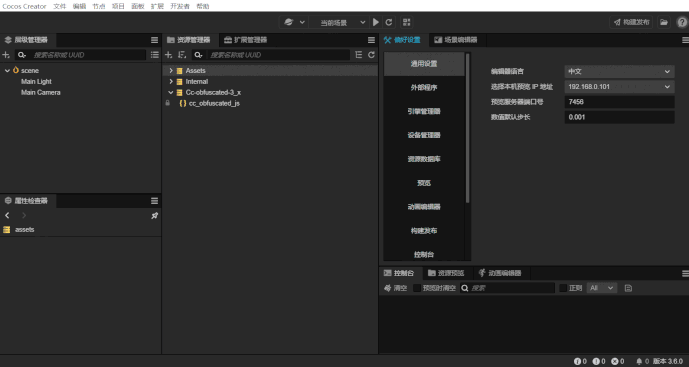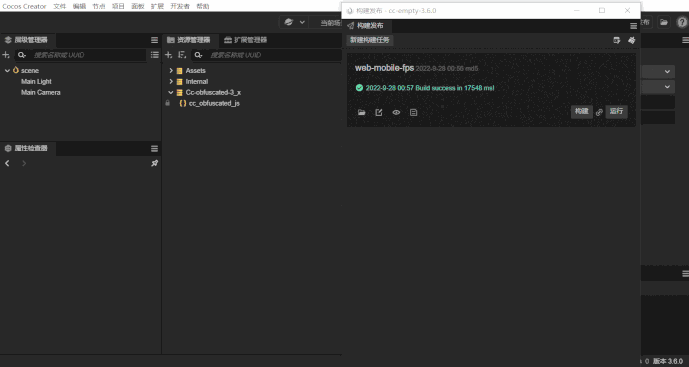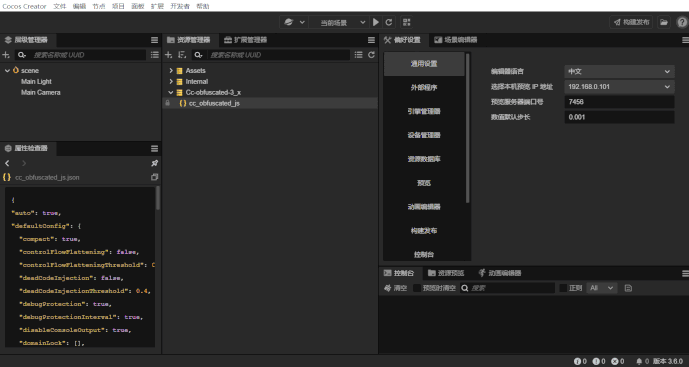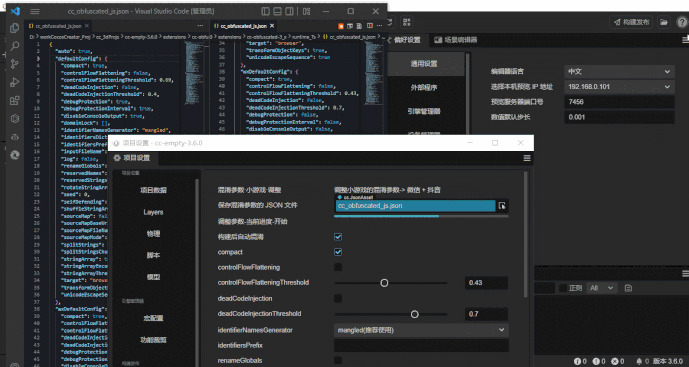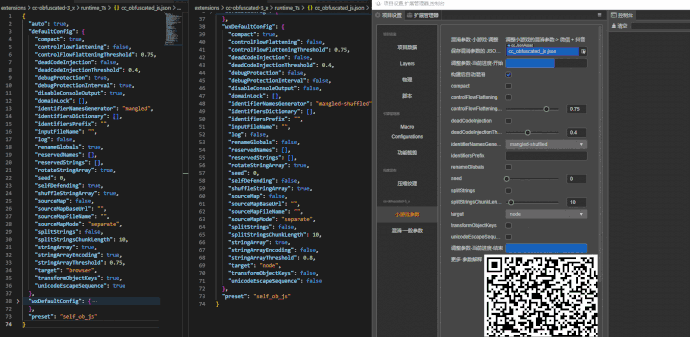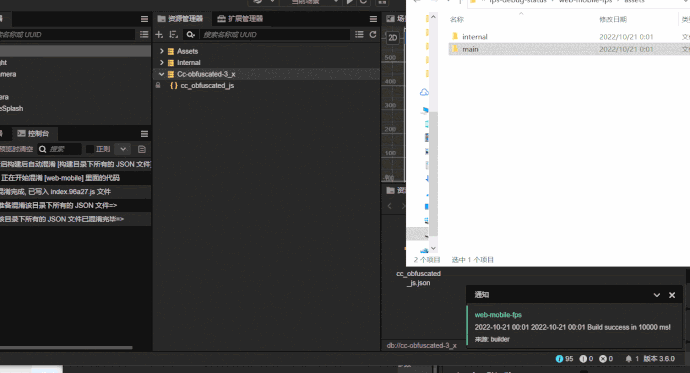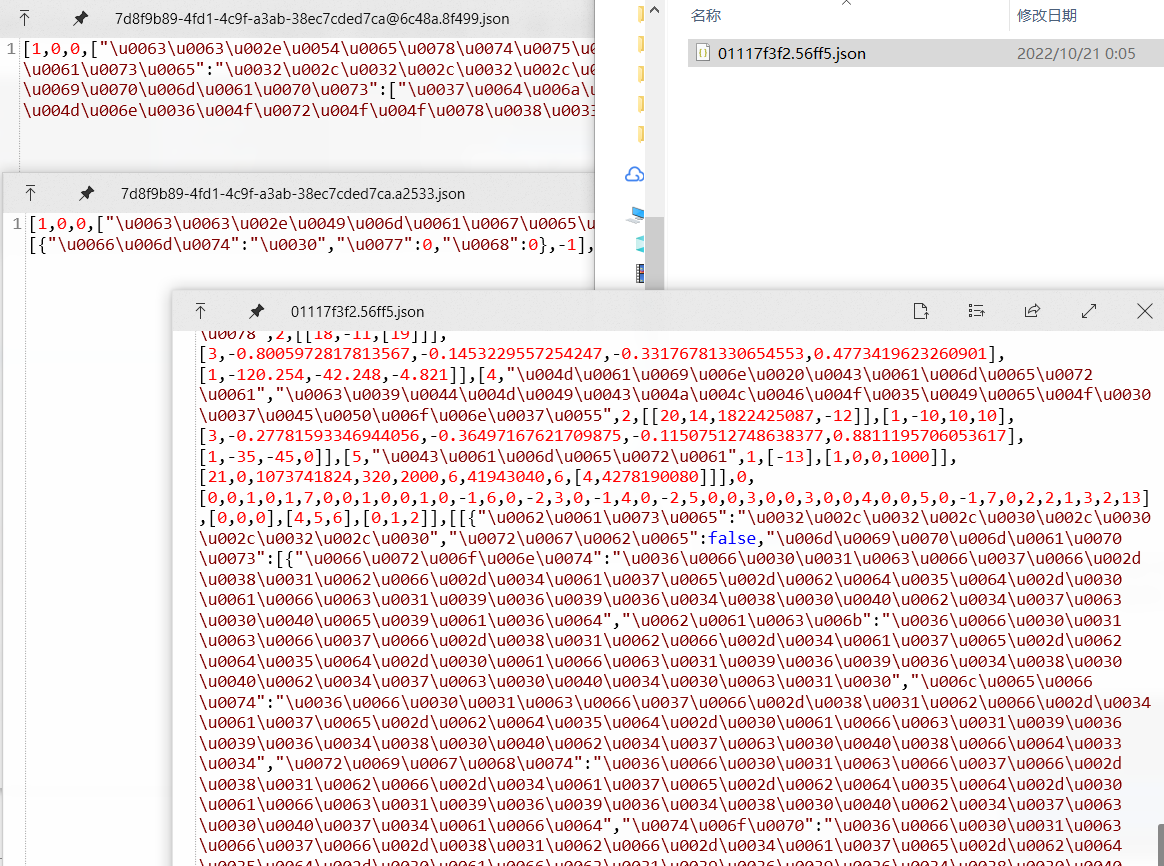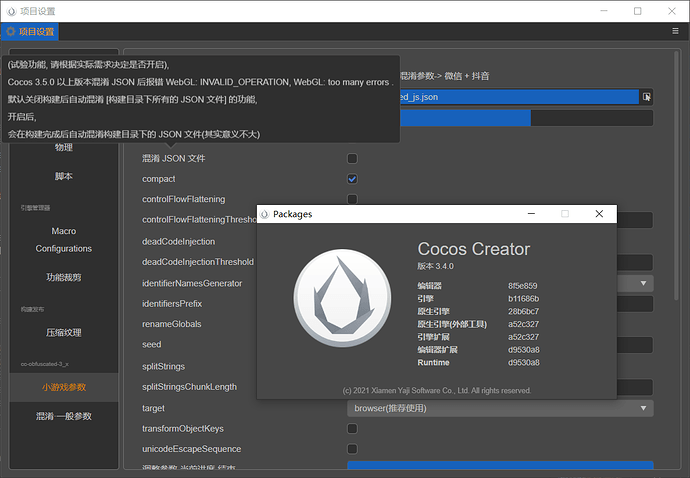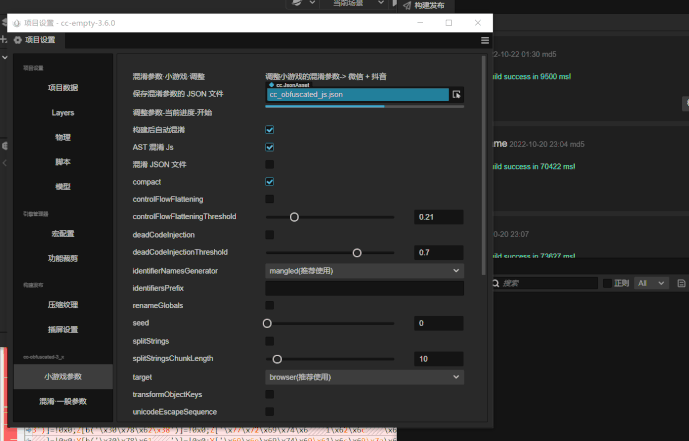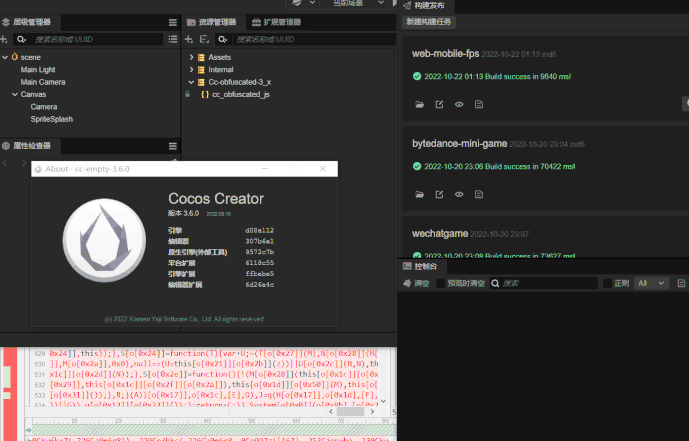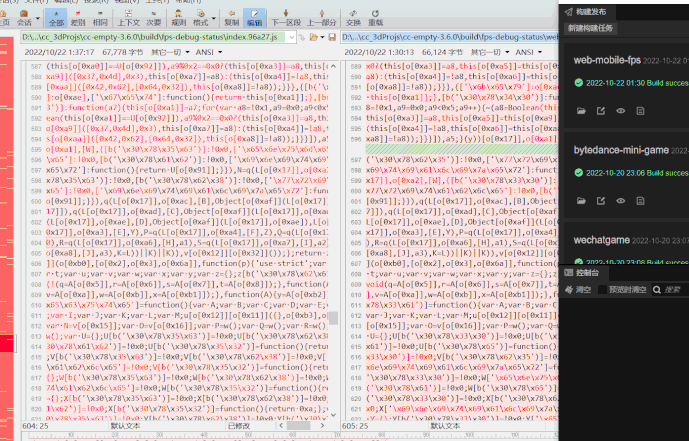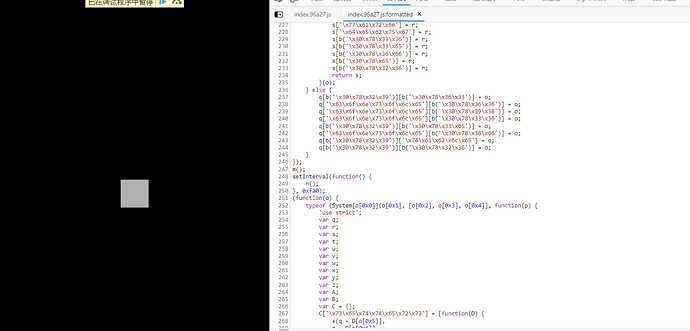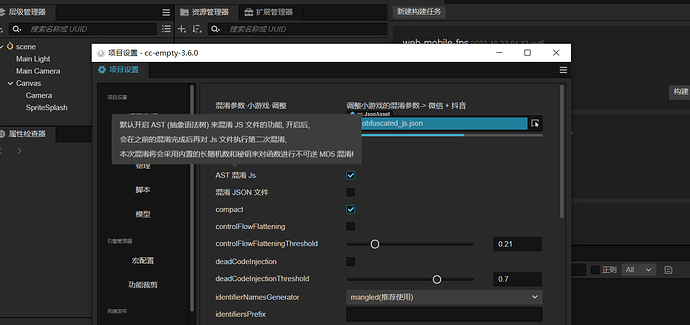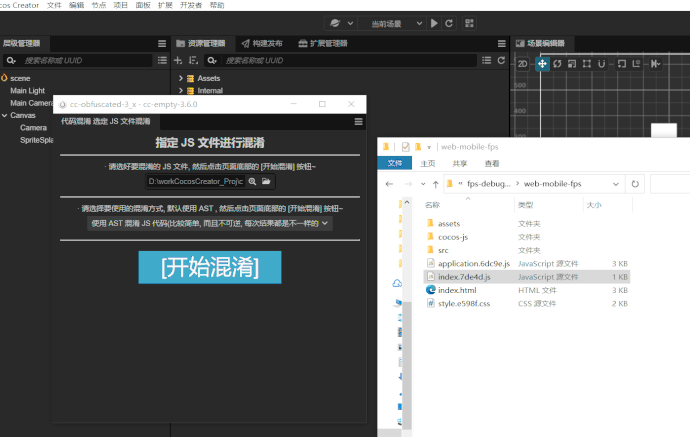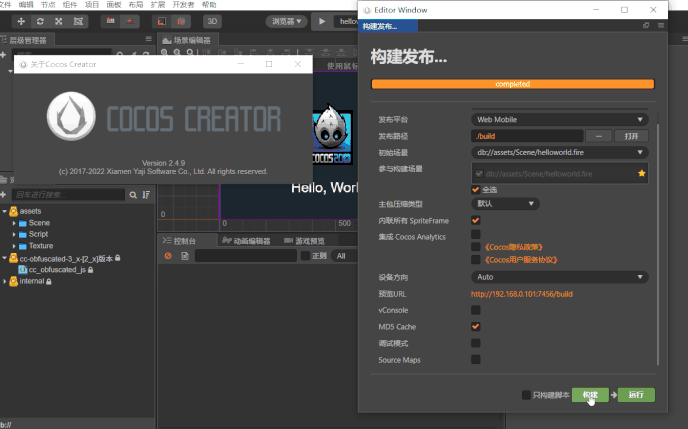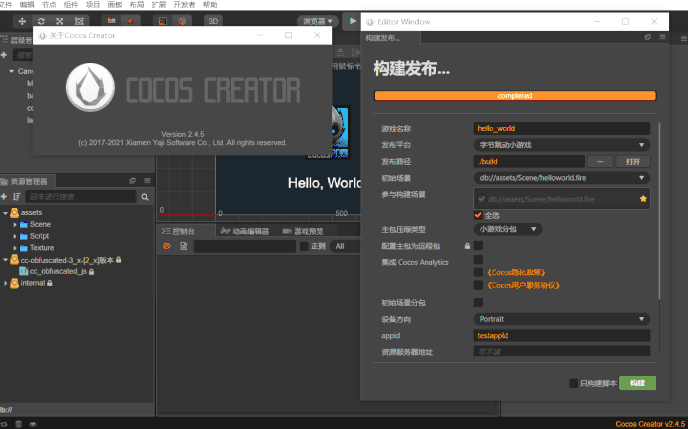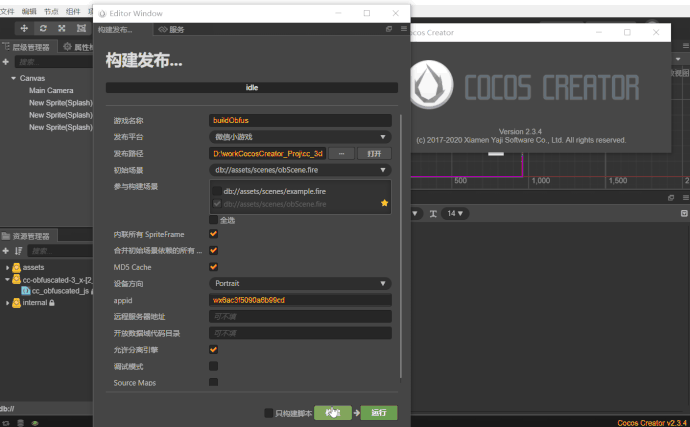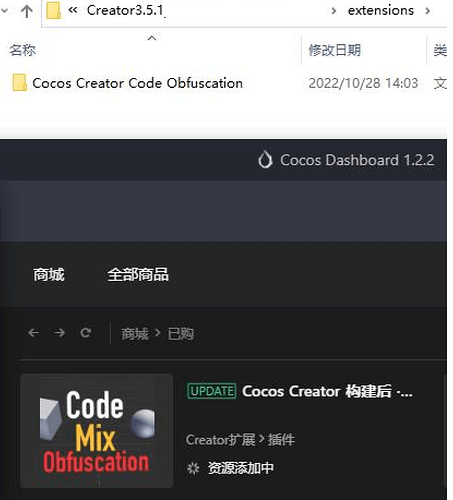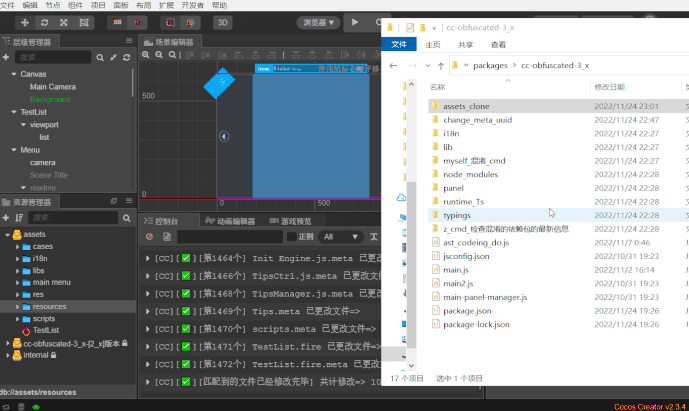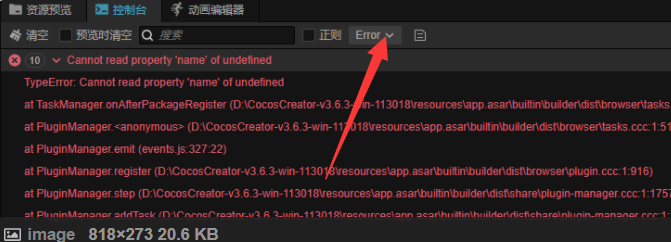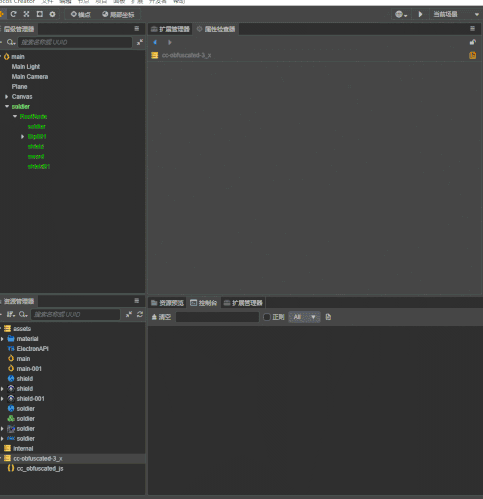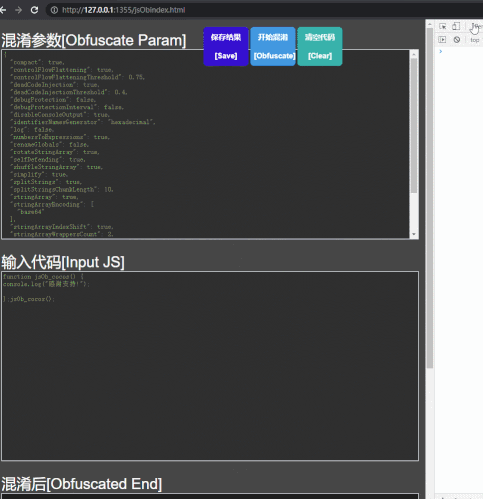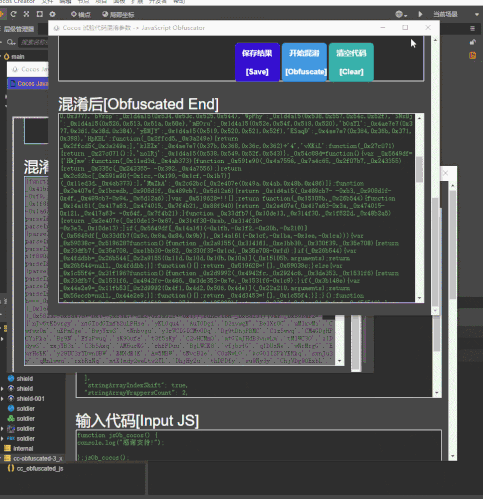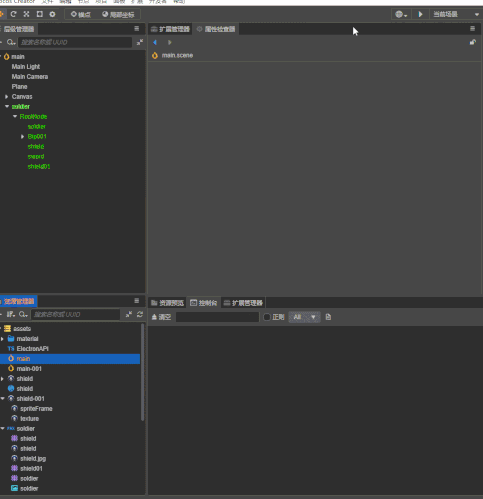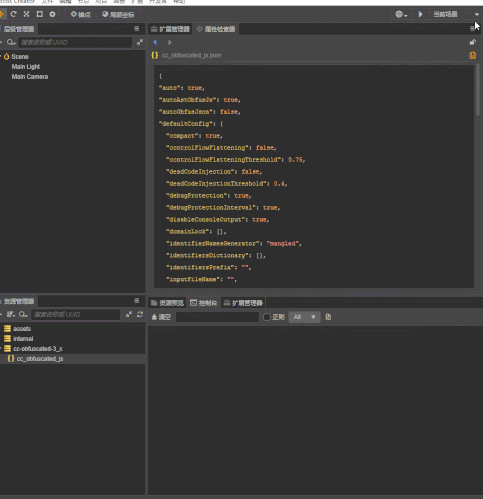Add + Available Options:
compact
Type: boolean Default: true
Compact code output on one line.
config
Type: string Default: ``
Name of JS/JSON config file which contains obfuscator options. These will be overridden by options passed directly to CLI
controlFlowFlattening
Type: boolean Default: false
 This option greatly affects the performance up to 1.5x slower runtime speed. Use
This option greatly affects the performance up to 1.5x slower runtime speed. Use controlFlowFlatteningThreshold to set percentage of nodes that will affected by control flow flattening.
Enables code control flow flattening. Control flow flattening is a structure transformation of the source code that hinders program comprehension.
Example:
// input
(function(){
function foo () {
return function () {
var sum = 1 + 2;
console.log(1);
console.log(2);
console.log(3);
console.log(4);
console.log(5);
console.log(6);
}
}
foo()();
})();
// output
(function () {
function _0x3bfc5c() {
return function () {
var _0x3260a5 = {
'WtABe': '4|0|6|5|3|2|1',
'GokKo': function _0xf87260(_0x427a8e, _0x43354c) {
return _0x427a8e + _0x43354c;
}
};
var _0x1ad4d6 = _0x3260a5['WtABe']['split']('|'), _0x1a7b12 = 0x0;
while (!![]) {
switch (_0x1ad4d6[_0x1a7b12++]) {
case '0':
console['log'](0x1);
continue;
case '1':
console['log'](0x6);
continue;
case '2':
console['log'](0x5);
continue;
case '3':
console['log'](0x4);
continue;
case '4':
var _0x1f2f2f = _0x3260a5['GokKo'](0x1, 0x2);
continue;
case '5':
console['log'](0x3);
continue;
case '6':
console['log'](0x2);
continue;
}
break;
}
};
}
_0x3bfc5c()();
}());
controlFlowFlatteningThreshold
Type: number Default: 0.75 Min: 0 Max: 1
The probability that the controlFlowFlattening transformation will be applied to any given node.
This setting is especially useful for large code size because large amounts of control flow transformations can slow down your code and increase code size.
controlFlowFlatteningThreshold: 0 equals to controlFlowFlattening: false .
deadCodeInjection
Type: boolean Default: false
 Dramatically increases size of obfuscated code (up to 200%), use only if size of obfuscated code doesn’t matter. Use
Dramatically increases size of obfuscated code (up to 200%), use only if size of obfuscated code doesn’t matter. Use deadCodeInjectionThreshold to set percentage of nodes that will affected by dead code injection.
 This option forcibly enables
This option forcibly enables stringArray option.
With this option, random blocks of dead code will be added to the obfuscated code.
Example:
// input
(function(){
if (true) {
var foo = function () {
console.log('abc');
};
var bar = function () {
console.log('def');
};
var baz = function () {
console.log('ghi');
};
var bark = function () {
console.log('jkl');
};
var hawk = function () {
console.log('mno');
};
foo();
bar();
baz();
bark();
hawk();
}
})();
// output
var _0x37b8 = [
'YBCtz',
'GlrkA',
'urPbb',
'abc',
'NMIhC',
'yZgAj',
'zrAId',
'EtyJA',
'log',
'mno',
'jkl',
'def',
'Quzya',
'IWbBa',
'ghi'
];
function _0x43a7(_0x12cf56, _0x587376) {
_0x43a7 = function (_0x2f87a8, _0x47eac2) {
_0x2f87a8 = _0x2f87a8 - (0x16a7 * 0x1 + 0x5 * 0x151 + -0x1c92);
var _0x341e03 = _0x37b8[_0x2f87a8];
return _0x341e03;
};
return _0x43a7(_0x12cf56, _0x587376);
}
(function () {
if (!![]) {
var _0xbbe28f = function () {
var _0x2fc85f = _0x43a7;
if (_0x2fc85f(0xaf) === _0x2fc85f(0xae)) {
_0x1dd94f[_0x2fc85f(0xb2)](_0x2fc85f(0xb5));
} else {
console[_0x2fc85f(0xb2)](_0x2fc85f(0xad));
}
};
var _0x5e46bc = function () {
var _0x15b472 = _0x43a7;
if (_0x15b472(0xb6) !== _0x15b472(0xaa)) {
console[_0x15b472(0xb2)](_0x15b472(0xb5));
} else {
_0x47eac2[_0x15b472(0xb2)](_0x15b472(0xad));
}
};
var _0x3669e8 = function () {
var _0x47a442 = _0x43a7;
if (_0x47a442(0xb7) !== _0x47a442(0xb0)) {
console[_0x47a442(0xb2)](_0x47a442(0xb8));
} else {
_0x24e0bf[_0x47a442(0xb2)](_0x47a442(0xb3));
}
};
var _0x28b05a = function () {
var _0x497902 = _0x43a7;
if (_0x497902(0xb1) === _0x497902(0xb1)) {
console[_0x497902(0xb2)](_0x497902(0xb4));
} else {
_0x59c9c6[_0x497902(0xb2)](_0x497902(0xb4));
}
};
var _0x402a54 = function () {
var _0x1906b7 = _0x43a7;
if (_0x1906b7(0xab) === _0x1906b7(0xac)) {
_0xb89cd0[_0x1906b7(0xb2)](_0x1906b7(0xb8));
} else {
console[_0x1906b7(0xb2)](_0x1906b7(0xb3));
}
};
_0xbbe28f();
_0x5e46bc();
_0x3669e8();
_0x28b05a();
_0x402a54();
}
}());
deadCodeInjectionThreshold
Type: number Default: 0.4 Min: 0 Max: 1
Allows to set percentage of nodes that will affected by deadCodeInjection .
debugProtection
Type: boolean Default: false
 Can freeze your browser if you open the Developer Tools.
Can freeze your browser if you open the Developer Tools.
This option makes it almost impossible to use the debugger function of the Developer Tools (both on WebKit-based and Mozilla Firefox).
debugProtectionInterval
Type: number Default: 0
 Can freeze your browser! Use at own risk.
Can freeze your browser! Use at own risk.
If set, an interval in milliseconds is used to force the debug mode on the Console tab, making it harder to use other features of the Developer Tools. Works if debugProtection is enabled. Recommended value is between 2000 and 4000 milliseconds.
disableConsoleOutput
Type: boolean Default: false
 This option disables
This option disables console calls globally for all scripts
Disables the use of console.log , console.info , console.error , console.warn , console.debug , console.exception and console.trace by replacing them with empty functions. This makes the use of the debugger harder.
domainLock
Type: string[] Default: []
 This option does not work with
This option does not work with target: 'node'
Allows to run the obfuscated source code only on specific domains and/or sub-domains. This makes really hard for someone to just copy and paste your source code and run it elsewhere.
If the source code isn’t run on the domains specified by this option, the browser will be redirected to a passed to the domainLockRedirectUrl option URL.
Multiple domains and sub-domains
It’s possible to lock your code to more than one domain or sub-domain. For instance, to lock it so the code only runs on www.example.com add www.example.com . To make it work on the root domain including any sub-domains ( example.com , sub.example.com ), use .example.com .
domainLockRedirectUrl
Type: string Default: about:blank
 This option does not work with
This option does not work with target: 'node'
Allows the browser to be redirected to a passed URL if the source code isn’t run on the domains specified by domainLock
exclude
Type: string[] Default: []
A file names or globs which indicates files to exclude from obfuscation.
forceTransformStrings
Type: string[] Default: []
Enables force transformation of string literals, which being matched by passed RegExp patterns.
 This option affects only strings that shouldn’t be transformed by
This option affects only strings that shouldn’t be transformed by stringArrayThreshold (or possible other thresholds in the future)
The option has a priority over reservedStrings option but hasn’t a priority over conditional comments .
Example:
{
forceTransformStrings: [
'some-important-value',
'some-string_\d'
]
}
identifierNamesCache
Type: Object | null Default: null
The main goal for this option is the ability to use the same identifier names during obfuscation of multiple sources/files.
Currently the two types of the identifiers are supported:
- Global identifiers:
- All global identifiers will be written to the cache;
- All matched undeclared global identifiers will be replaced by the values from the cache.
- Property identifiers, only when
renameProperties option is enabled:
- All property identifiers will be written to the cache;
- All matched property identifiers will be replaced by the values from the cache.
Node.js API
If a null value is passed, completely disables the cache.
If an empty object ( {} ) is passed, enables the writing identifier names to the cache-object ( TIdentifierNamesCache type). This cache-object will be accessed through the getIdentifierNamesCache method call of ObfuscationResult object.
The resulting cache-object can be next used as identifierNamesGenerator option value for using these names during obfuscation of all matched identifier names of next sources.
Example:
const source1ObfuscationResult = JavaScriptObfuscator.obfuscate(
`
function foo(arg) {
console.log(arg)
}
function bar() {
var bark = 2;
}
`,
{
compact: false,
identifierNamesCache: {},
renameGlobals: true
}
)
console.log(source1ObfuscationResult.getIdentifierNamesCache());
/*
{
globalIdentifiers: {
foo: '_0x5de86d',
bar: '_0x2a943b'
}
}
*/
const source2ObfuscationResult = JavaScriptObfuscator.obfuscate(
`
// Expecting that these global functions are defined in another obfuscated file
foo(1);
bar();
// Expecting that this global function is defined in third-party package
baz();
`,
{
compact: false,
identifierNamesCache: source1ObfuscationResult.getIdentifierNamesCache(),
renameGlobals: true
}
)
console.log(source2ObfuscationResult.getObfuscatedCode());
/*
_0x5de86d(0x1);
_0x2a943b();
baz();
*/
CLI
CLI has a different option --identifier-names-cache-path that allows defining a path to the existing .json file that will be used to read and write identifier names cache.
If a path to the empty file will be passed - identifier names cache will be written to that file.
This file with existing cache can be used again as --identifier-names-cache-path option value for using these names during obfuscation of all matched identifier names of the next files.
identifierNamesGenerator
Type: string Default: hexadecimal
Sets identifier names generator.
Available values:
-
dictionary : identifier names from identifiersDictionary list
-
hexadecimal : identifier names like _0xabc123
-
mangled : short identifier names like a , b , c
-
mangled-shuffled : same as mangled but with shuffled alphabet
identifiersDictionary
Type: string[] Default: []
Sets identifiers dictionary for identifierNamesGenerator : dictionary option. Each identifier from the dictionary will be used in a few variants with a different casing of each character. Thus, the number of identifiers in the dictionary should depend on the identifiers amount at original source code.
identifiersPrefix
Type: string Default: ''
Sets prefix for all global identifiers.
Use this option when you want to obfuscate multiple files. This option helps to avoid conflicts between global identifiers of these files. Prefix should be different for every file.
ignoreRequireImports
Type: boolean Default: false
Prevents obfuscation of require imports. Could be helpful in some cases when for some reason runtime environment requires these imports with static strings only.
inputFileName
Type: string Default: ''
Allows to set name of the input file with source code. This name will be used internally for source map generation. Required when using NodeJS API and sourceMapSourcesMode option has sources value`.
log
Type: boolean Default: false
Enables logging of the information to the console.
numbersToExpressions
Type: boolean Default: false
Enables numbers conversion to expressions
Example:
// input
const foo = 1234;
// output
const foo=-0xd93+-0x10b4+0x41*0x67+0x84e*0x3+-0xff8;
optionsPreset
Type: string Default: default
Allows to set options preset.
Available values:
-
default ;
-
low-obfuscation ;
-
medium-obfuscation ;
-
high-obfuscation .
All addition options will be merged with selected options preset.
renameGlobals
Type: boolean Default: false
 this option can break your code. Enable it only if you know what it does!
this option can break your code. Enable it only if you know what it does!
Enables obfuscation of global variable and function names with declaration .
renameProperties
Type: boolean Default: false
 this option MAY break your code. Enable it only if you know what it does!
this option MAY break your code. Enable it only if you know what it does!
Enables renaming of property names. All built-in DOM properties and properties in core JavaScript classes will be ignored.
To switch between safe and unsafe modes of this option use renamePropertiesMode option.
To set format of renamed property names use identifierNamesGenerator option.
To control which properties will be renamed use reservedNames option.
Example:
// input
(function () {
const foo = {
prop1: 1,
prop2: 2,
calc: function () {
return this.prop1 + this.prop2;
}
};
console.log(foo.calc());
})();
// output
(function () {
const _0x46529b = {
'_0x10cec7': 0x1,
'_0xc1c0ca': 0x2,
'_0x4b961d': function () {
return this['_0x10cec7'] + this['_0xc1c0ca'];
}
};
console['log'](_0x46529b['_0x4b961d']());
}());
renamePropertiesMode
Type: string Default: safe
 Even in
Even in safe mode, renameProperties option MAY break your code.
Specifies renameProperties option mode:
-
safe - default behaviour after 2.11.0 release. Trying to rename properties in a more safe way to prevent runtime errors. With this mode some properties will be excluded from renaming.
-
unsafe - default behaviour before 2.11.0 release. Renames properties in an unsafe way without any restrictions.
If one file is using properties from other file, use identifierNamesCache option to keep the same property names between these files.
reservedNames
Type: string[] Default: []
Disables obfuscation and generation of identifiers, which being matched by passed RegExp patterns.
Example:
{
reservedNames: [
'^someVariable',
'functionParameter_\d'
]
}
reservedStrings
Type: string[] Default: []
Disables transformation of string literals, which being matched by passed RegExp patterns.
Example:
{
reservedStrings: [
'react-native',
'\.\/src\/test',
'some-string_\d'
]
}
seed
Type: string|number Default: 0
This option sets seed for random generator. This is useful for creating repeatable results.
If seed is 0 - random generator will work without seed.
selfDefending
Type: boolean Default: false
 Don’t change obfuscated code in any way after obfuscation with this option, because any change like uglifying of code can trigger self defending and code wont work anymore!
Don’t change obfuscated code in any way after obfuscation with this option, because any change like uglifying of code can trigger self defending and code wont work anymore!
 This option forcibly sets
This option forcibly sets compact value to true
This option makes the output code resilient against formatting and variable renaming. If one tries to use a JavaScript beautifier on the obfuscated code, the code won’t work anymore, making it harder to understand and modify it.
simplify
Type: boolean Default: true
Enables additional code obfuscation through simplification.
 in future releases obfuscation of
in future releases obfuscation of boolean literals ( true => !![] ) will be moved under this option.
Example:
// input
if (condition1) {
const foo = 1;
const bar = 2;
console.log(foo);
return bar;
} else if (condition2) {
console.log(1);
console.log(2);
console.log(3);
return 4;
} else {
return 5;
}
// output
if (condition1) {
const foo = 0x1, bar = 0x2;
return console['log'](foo), bar;
} else
return condition2 ? (console['log'](0x1), console['log'](0x2), console['log'](0x3), 0x4) : 0x5;
sourceMap
Type: boolean Default: false
Enables source map generation for obfuscated code.
Source maps can be useful to help you debug your obfuscated JavaScript source code. If you want or need to debug in production, you can upload the separate source map file to a secret location and then point your browser there.
sourceMapBaseUrl
Type: string Default: ``
Sets base url to the source map import url when sourceMapMode: 'separate' .
CLI example:
javascript-obfuscator input.js --output out.js --source-map true --source-map-base-url 'http://localhost:9000'
Result:
//# sourceMappingURL=http://localhost:9000/out.js.map
sourceMapFileName
Type: string Default: ``
Sets file name for output source map when sourceMapMode: 'separate' .
CLI example:
javascript-obfuscator input.js --output out.js --source-map true --source-map-base-url 'http://localhost:9000' --source-map-file-name example
Result:
//# sourceMappingURL=http://localhost:9000/example.js.map
sourceMapMode
Type: string Default: separate
Specifies source map generation mode:
-
inline - add source map at the end of each .js files;
-
separate - generates corresponding ‘.map’ file with source map. In case you run obfuscator through CLI - adds link to source map file to the end of file with obfuscated code //# sourceMappingUrl=file.js.map .
sourceMapSourcesMode
Type: string Default: sources-content
Allows to control sources and sourcesContent fields of the source map:
-
sources-content - adds dummy sources field, adds sourcesContent field with the original source code;
-
sources - adds sources field with a valid source description, does not add sourcesContent field. When using NodeJS API it’s required to define inputFileName option that will be used as sources field value.
splitStrings
Type: boolean Default: false
Splits literal strings into chunks with length of splitStringsChunkLength option value.
Example:
// input
(function(){
var test = 'abcdefg';
})();
// output
(function(){
var _0x5a21 = 'ab' + 'cd' + 'ef' + 'g';
})();
splitStringsChunkLength
Type: number Default: 10
Sets chunk length of splitStrings option.
stringArray
Type: boolean Default: true
Removes string literals and place them in a special array. For instance, the string "Hello World" in var m = "Hello World"; will be replaced with something like var m = _0x12c456[0x1];
stringArrayCallsTransform
Type: boolean Default: false

stringArray option must be enabled
Enables the transformation of calls to the stringArray . All arguments of these calls may be extracted to a different object depending on stringArrayCallsTransformThreshold value. So it makes it even harder to automatically find calls to the string array.
Example:
function foo() {
var k = {
c: 0x2f2,
d: '0x396',
e: '0x397',
f: '0x39a',
g: '0x39d',
h: 0x398,
l: 0x394,
m: '0x39b',
n: '0x39f',
o: 0x395,
p: 0x395,
q: 0x399,
r: '0x399'
};
var c = i(k.d, k.e);
var d = i(k.f, k.g);
var e = i(k.h, k.l);
var f = i(k.m, k.n);
function i(c, d) {
return b(c - k.c, d);
}
var g = i(k.o, k.p);
var h = i(k.q, k.r);
}
function j(c, d) {
var l = { c: 0x14b };
return b(c - -l.c, d);
}
console[j(-'0xa6', -'0xa6')](foo());
function b(c, d) {
var e = a();
b = function (f, g) {
f = f - 0xa3;
var h = e[f];
return h;
};
return b(c, d);
}
function a() {
var m = [
'string5',
'string1',
'log',
'string3',
'string6',
'string2',
'string4'
];
a = function () {
return m;
};
return a();
}
stringArrayCallsTransformThreshold
Type: number Default: 0.5
You can use this setting to adjust the probability (from 0 to 1) that calls to the string array will be transformed.
stringArrayEncoding
Type: string[] Default: []

stringArray option must be enabled
This option can slow down your script.
Encode all string literals of the stringArray using base64 or rc4 and inserts a special code that used to decode it back at runtime.
Each stringArray value will be encoded by the randomly picked encoding from the passed list. This makes possible to use multiple encodings.
Available values:
-
'none' ( boolean ): doesn’t encode stringArray value
-
'base64' ( string ): encodes stringArray value using base64
-
'rc4' ( string ): encodes stringArray value using rc4 . About 30-50% slower than base64 , but more harder to get initial values. It’s recommended to disable unicodeEscapeSequence option when using rc4 encoding to prevent very large size of obfuscated code.
For example with the following option values some stringArray value won’t be encoded, and some values will be encoded with base64 and rc4 encoding:
stringArrayEncoding: [
'none',
'base64',
'rc4'
]
stringArrayIndexesType
Type: string[] Default: ['hexadecimal-number']

stringArray option must be enabled
Allows to control the type of string array call indexes.
Each stringArray call index will be transformed by the randomly picked type from the passed list. This makes possible to use multiple types.
Available values:
-
'hexadecimal-number' ( default ): transforms string array call indexes as hexadecimal numbers
-
'hexadecimal-numeric-string' : transforms string array call indexes as hexadecimal numeric string
Before 2.9.0 release javascript-obfuscator transformed all string array call indexes with hexadecimal-numeric-string type. This makes some manual deobfuscation slightly harder but it allows easy detection of these calls by automatic deobfuscators.
The new hexadecimal-number type approaches to make harder auto-detect of string array call patterns in the code.
More types will be added in the future.
stringArrayIndexShift
Type: boolean Default: true

stringArray option must be enabled
Enables additional index shift for all string array calls
stringArrayRotate
Type: boolean Default: true
Shift the stringArray array by a fixed and random (generated at the code obfuscation) places. This makes it harder to match the order of the removed strings to their original place.
stringArrayShuffle
Type: boolean Default: true
Randomly shuffles the stringArray array items.
stringArrayWrappersCount
Type: number Default: 1

stringArray option must be enabled
Sets the count of wrappers for the string array inside each root or function scope. The actual count of wrappers inside each scope is limited by a count of literal nodes within this scope.
Example:
// Input
const foo = 'foo';
const bar = 'bar';
function test () {
const baz = 'baz';
const bark = 'bark';
const hawk = 'hawk';
}
const eagle = 'eagle';
// Output, stringArrayWrappersCount: 5
const _0x3f6c = [
'bark',
'bar',
'foo',
'eagle',
'hawk',
'baz'
];
const _0x48f96e = _0x2e13;
const _0x4dfed8 = _0x2e13;
const _0x55e970 = _0x2e13;
function _0x2e13(_0x33c4f5, _0x3f6c62) {
_0x2e13 = function (_0x2e1388, _0x60b1e) {
_0x2e1388 = _0x2e1388 - 0xe2;
let _0x53d475 = _0x3f6c[_0x2e1388];
return _0x53d475;
};
return _0x2e13(_0x33c4f5, _0x3f6c62);
}
const foo = _0x48f96e(0xe4);
const bar = _0x4dfed8(0xe3);
function test() {
const _0x1c262f = _0x2e13;
const _0x54d7a4 = _0x2e13;
const _0x5142fe = _0x2e13;
const _0x1392b0 = _0x1c262f(0xe7);
const _0x201a58 = _0x1c262f(0xe2);
const _0xd3a7fb = _0x1c262f(0xe6);
}
const eagle = _0x48f96e(0xe5);
stringArrayWrappersChainedCalls
Type: boolean Default: true
Enables the chained calls between string array wrappers.
Example:
// Input
const foo = 'foo';
const bar = 'bar';
function test () {
const baz = 'baz';
const bark = 'bark';
function test1() {
const hawk = 'hawk';
const eagle = 'eagle';
}
}
// Output, stringArrayWrappersCount: 5, stringArrayWrappersChainedCalls: true
const _0x40c2 = [
'bar',
'bark',
'hawk',
'eagle',
'foo',
'baz'
];
const _0x31c087 = _0x3280;
const _0x31759a = _0x3280;
function _0x3280(_0x1f52ee, _0x40c2a2) {
_0x3280 = function (_0x3280a4, _0xf07b02) {
_0x3280a4 = _0x3280a4 - 0x1c4;
let _0x57a182 = _0x40c2[_0x3280a4];
return _0x57a182;
};
return _0x3280(_0x1f52ee, _0x40c2a2);
}
const foo = _0x31c087(0x1c8);
const bar = _0x31c087(0x1c4);
function test() {
const _0x848719 = _0x31759a;
const _0x2693bf = _0x31c087;
const _0x2c08e8 = _0x848719(0x1c9);
const _0x359365 = _0x2693bf(0x1c5);
function _0x175e90() {
const _0x310023 = _0x848719;
const _0x2302ef = _0x2693bf;
const _0x237437 = _0x310023(0x1c6);
const _0x56145c = _0x310023(0x1c7);
}
}
stringArrayWrappersParametersMaxCount
Type: number Default: 2

stringArray option must be enabled
 Currently this option affects only wrappers added by
Currently this option affects only wrappers added by stringArrayWrappersType function option value
Allows to control the maximum number of string array wrappers parameters. Default and minimum value is 2 . Recommended value between 2 and 5 .
stringArrayWrappersType
Type: string Default: variable
Allows to select a type of the wrappers that are appending by the stringArrayWrappersCount option.
Available values:
-
'variable' : appends variable wrappers at the top of each scope. Fast performance.
-
'function' : appends function wrappers at random positions inside each scope. Slower performance than with variable but provides more strict obfuscation.
Highly recommended to use function wrappers for higher obfuscation when a performance loss doesn’t have a high impact on an obfuscated application.
Example of the 'function' option value:
// input
const foo = 'foo';
function test () {
const bar = 'bar';
console.log(foo, bar);
}
test();
// output
const a = [
'log',
'bar',
'foo'
];
const foo = d(0x567, 0x568);
function b(c, d) {
b = function (e, f) {
e = e - 0x185;
let g = a[e];
return g;
};
return b(c, d);
}
function test() {
const c = e(0x51c, 0x51b);
function e (c, g) {
return b(c - 0x396, g);
}
console[f(0x51b, 0x51d)](foo, c);
function f (c, g) {
return b(c - 0x396, g);
}
}
function d (c, g) {
return b(g - 0x3e1, c);
}
test();
stringArrayThreshold
Type: number Default: 0.8 Min: 0 Max: 1

stringArray option must be enabled
You can use this setting to adjust the probability (from 0 to 1) that a string literal will be inserted into the stringArray .
This setting is especially useful for large code size because it repeatedly calls to the string array and can slow down your code.
stringArrayThreshold: 0 equals to stringArray: false .
target
Type: string Default: browser
Allows to set target environment for obfuscated code.
Available values:
-
browser ;
-
browser-no-eval ;
-
node .
Currently output code for browser and node targets is identical, but some browser-specific options are not allowed to use with node target. Output code for browser-no-eval target is not using eval .
transformObjectKeys
Type: boolean Default: false
Enables transformation of object keys.
Example:
// input
(function(){
var object = {
foo: 'test1',
bar: {
baz: 'test2'
}
};
})();
// output
var _0x4735 = [
'foo',
'baz',
'bar',
'test1',
'test2'
];
function _0x390c(_0x33d6b6, _0x4735f4) {
_0x390c = function (_0x390c37, _0x1eed85) {
_0x390c37 = _0x390c37 - 0x198;
var _0x2275f8 = _0x4735[_0x390c37];
return _0x2275f8;
};
return _0x390c(_0x33d6b6, _0x4735f4);
}
(function () {
var _0x17d1b7 = _0x390c;
var _0xc9b6bb = {};
_0xc9b6bb[_0x17d1b7(0x199)] = _0x17d1b7(0x19c);
var _0x3d959a = {};
_0x3d959a[_0x17d1b7(0x198)] = _0x17d1b7(0x19b);
_0x3d959a[_0x17d1b7(0x19a)] = _0xc9b6bb;
var _0x41fd86 = _0x3d959a;
}());
unicodeEscapeSequence
Type: boolean Default: false
Allows to enable/disable string conversion to unicode escape sequence.
Unicode escape sequence increases code size greatly and strings easily can be reverted to their original view. Recommended to enable this option only for small source code.
Preset Options
High obfuscation, low performance
The performance will be much slower than without obfuscation
{
compact: true,
controlFlowFlattening: true,
controlFlowFlatteningThreshold: 1,
deadCodeInjection: true,
deadCodeInjectionThreshold: 1,
debugProtection: true,
debugProtectionInterval: 4000,
disableConsoleOutput: true,
identifierNamesGenerator: 'hexadecimal',
log: false,
numbersToExpressions: true,
renameGlobals: false,
selfDefending: true,
simplify: true,
splitStrings: true,
splitStringsChunkLength: 5,
stringArray: true,
stringArrayCallsTransform: true,
stringArrayEncoding: ['rc4'],
stringArrayIndexShift: true,
stringArrayRotate: true,
stringArrayShuffle: true,
stringArrayWrappersCount: 5,
stringArrayWrappersChainedCalls: true,
stringArrayWrappersParametersMaxCount: 5,
stringArrayWrappersType: 'function',
stringArrayThreshold: 1,
transformObjectKeys: true,
unicodeEscapeSequence: false
}
Medium obfuscation, optimal performance
The performance will be slower than without obfuscation
{
compact: true,
controlFlowFlattening: true,
controlFlowFlatteningThreshold: 0.75,
deadCodeInjection: true,
deadCodeInjectionThreshold: 0.4,
debugProtection: false,
debugProtectionInterval: 0,
disableConsoleOutput: true,
identifierNamesGenerator: 'hexadecimal',
log: false,
numbersToExpressions: true,
renameGlobals: false,
selfDefending: true,
simplify: true,
splitStrings: true,
splitStringsChunkLength: 10,
stringArray: true,
stringArrayCallsTransform: true,
stringArrayCallsTransformThreshold: 0.75,
stringArrayEncoding: ['base64'],
stringArrayIndexShift: true,
stringArrayRotate: true,
stringArrayShuffle: true,
stringArrayWrappersCount: 2,
stringArrayWrappersChainedCalls: true,
stringArrayWrappersParametersMaxCount: 4,
stringArrayWrappersType: 'function',
stringArrayThreshold: 0.75,
transformObjectKeys: true,
unicodeEscapeSequence: false
}
Low obfuscation, High performance
The performance will be at a relatively normal level
{
compact: true,
controlFlowFlattening: false,
deadCodeInjection: false,
debugProtection: false,
debugProtectionInterval: 0,
disableConsoleOutput: true,
identifierNamesGenerator: 'hexadecimal',
log: false,
numbersToExpressions: false,
renameGlobals: false,
selfDefending: true,
simplify: true,
splitStrings: false,
stringArray: true,
stringArrayCallsTransform: false,
stringArrayEncoding: [],
stringArrayIndexShift: true,
stringArrayRotate: true,
stringArrayShuffle: true,
stringArrayWrappersCount: 1,
stringArrayWrappersChainedCalls: true,
stringArrayWrappersParametersMaxCount: 2,
stringArrayWrappersType: 'variable',
stringArrayThreshold: 0.75,
unicodeEscapeSequence: false
}
Default preset, High performance
{
compact: true,
controlFlowFlattening: false,
deadCodeInjection: false,
debugProtection: false,
debugProtectionInterval: 0,
disableConsoleOutput: false,
identifierNamesGenerator: 'hexadecimal',
log: false,
numbersToExpressions: false,
renameGlobals: false,
selfDefending: false,
simplify: true,
splitStrings: false,
stringArray: true,
stringArrayCallsTransform: false,
stringArrayCallsTransformThreshold: 0.5,
stringArrayEncoding: [],
stringArrayIndexShift: true,
stringArrayRotate: true,
stringArrayShuffle: true,
stringArrayWrappersCount: 1,
stringArrayWrappersChainedCalls: true,
stringArrayWrappersParametersMaxCount: 2,
stringArrayWrappersType: 'variable',
stringArrayThreshold: 0.75,
unicodeEscapeSequence: false
}














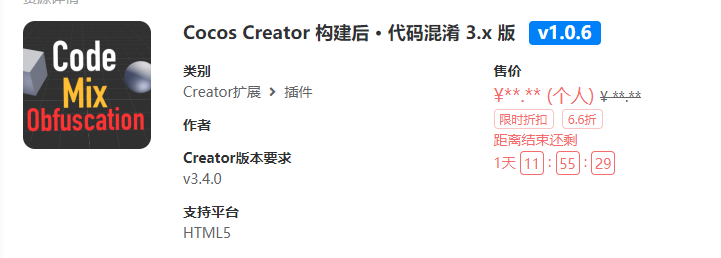

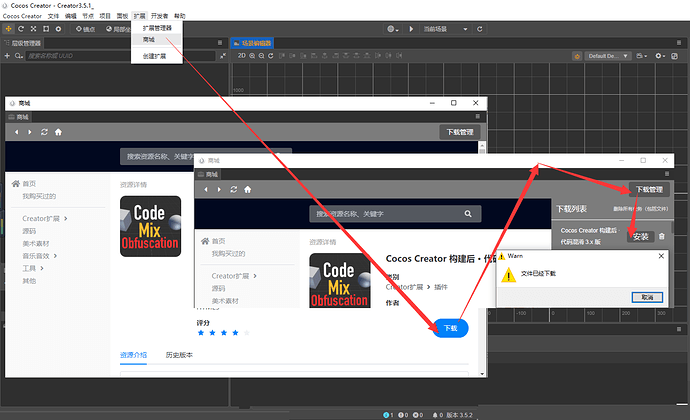
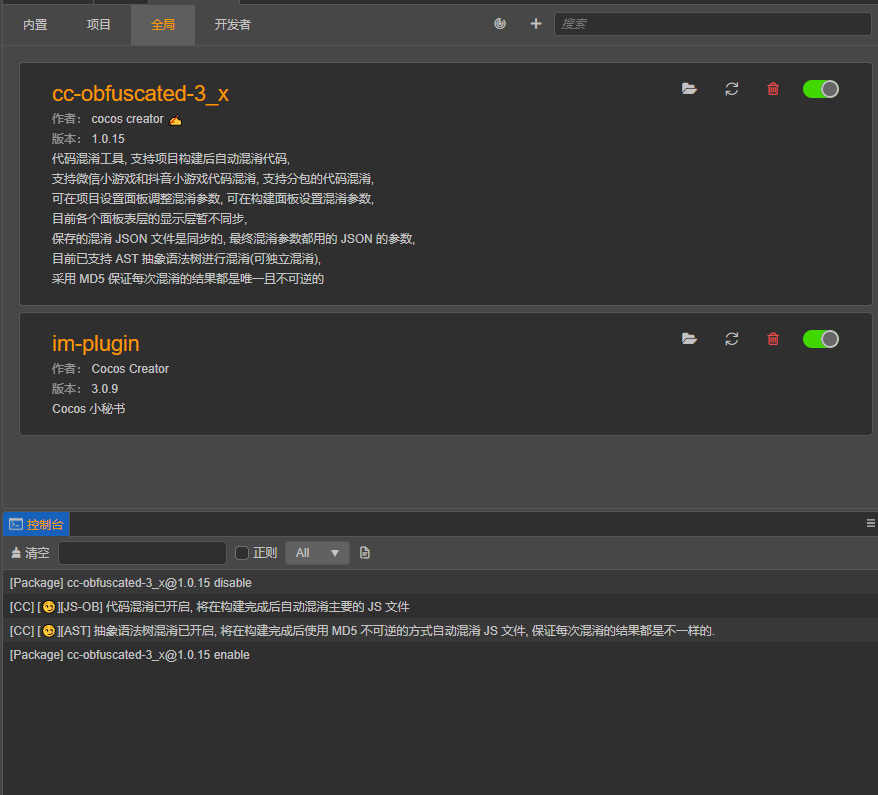
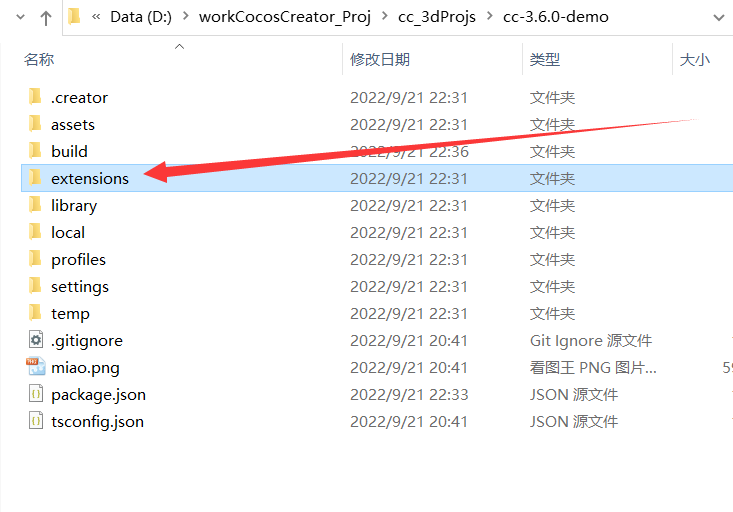
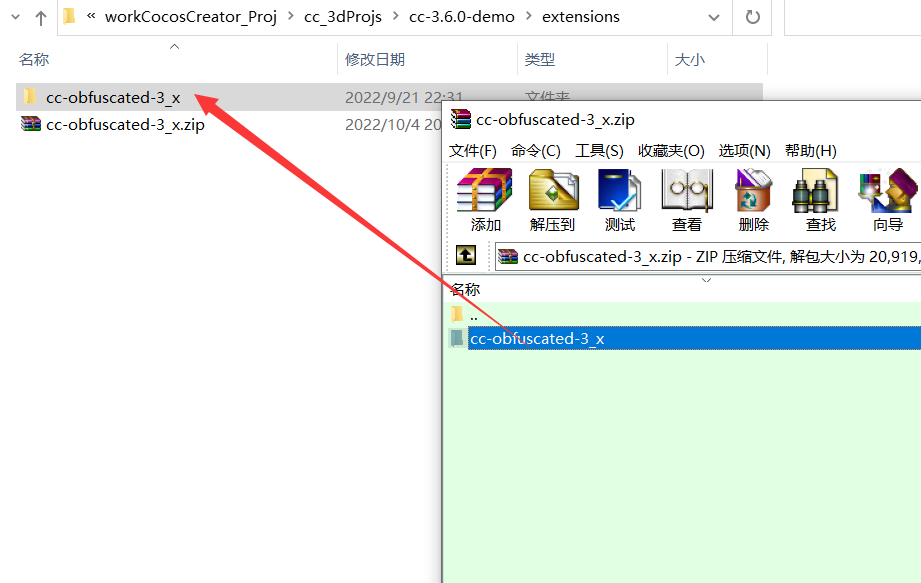
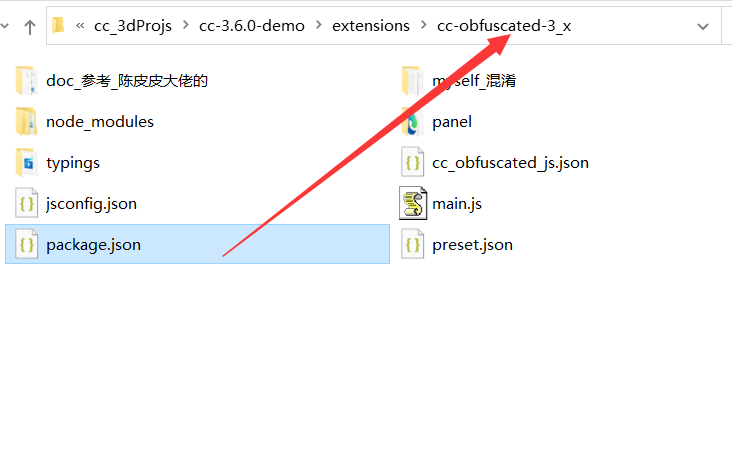
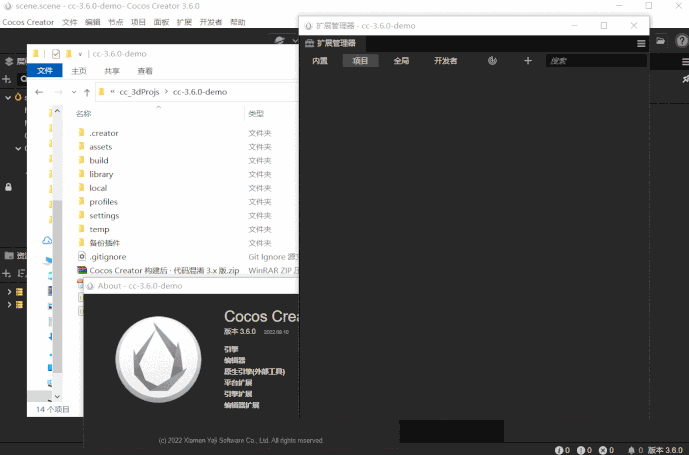
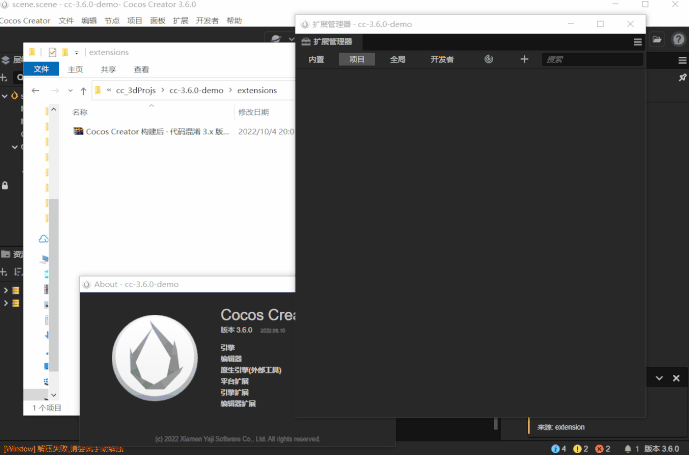
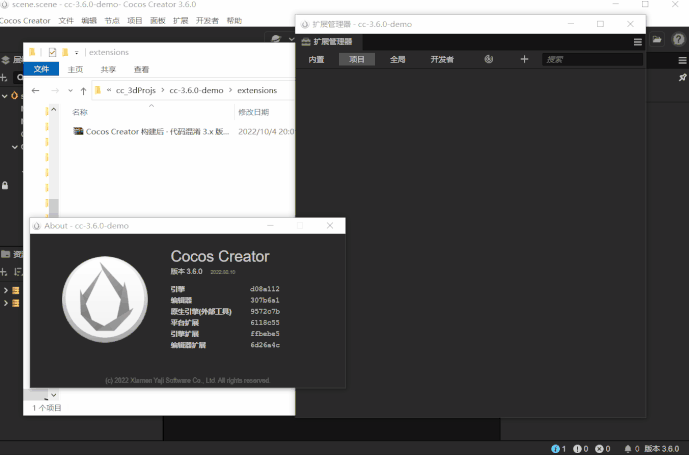
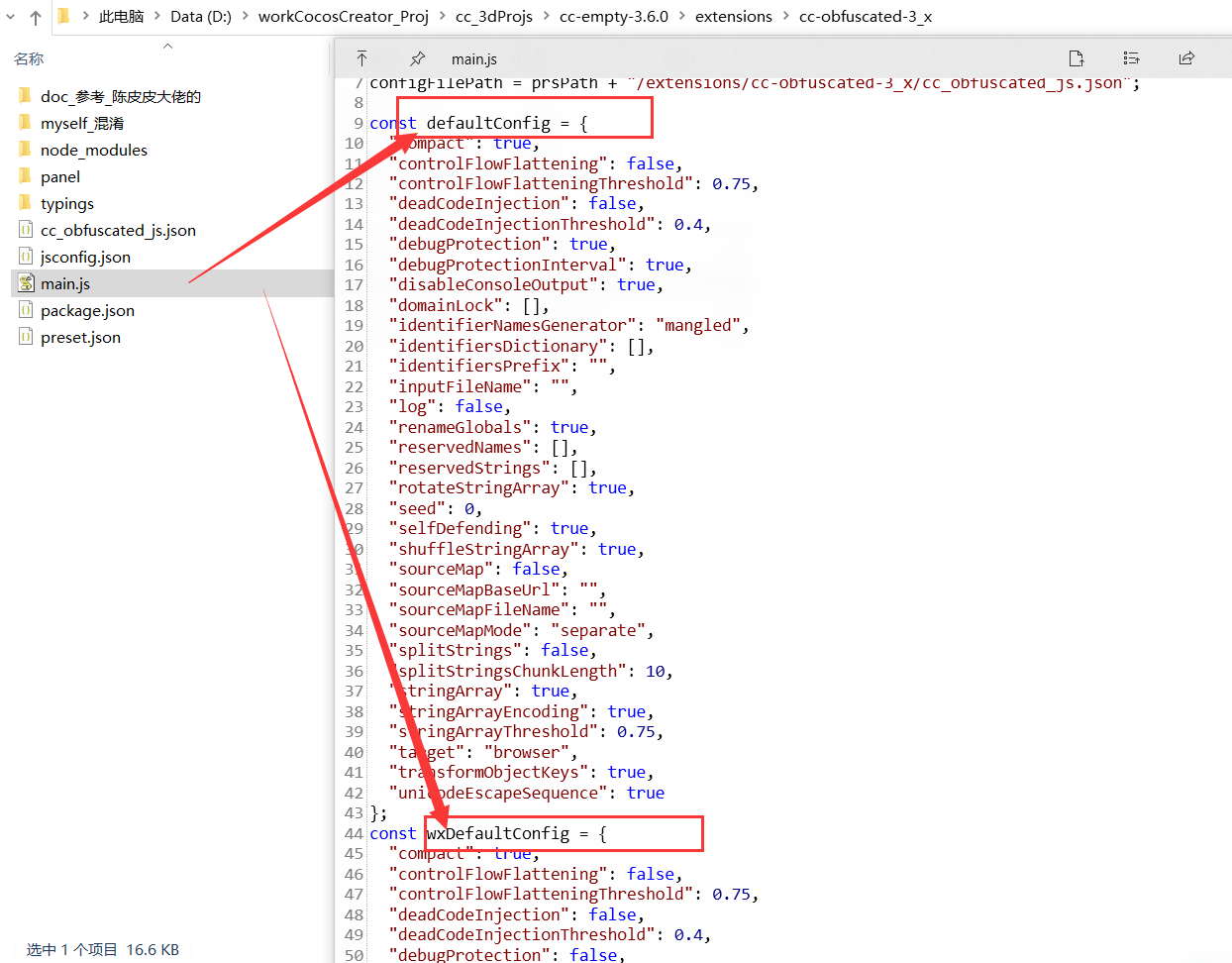
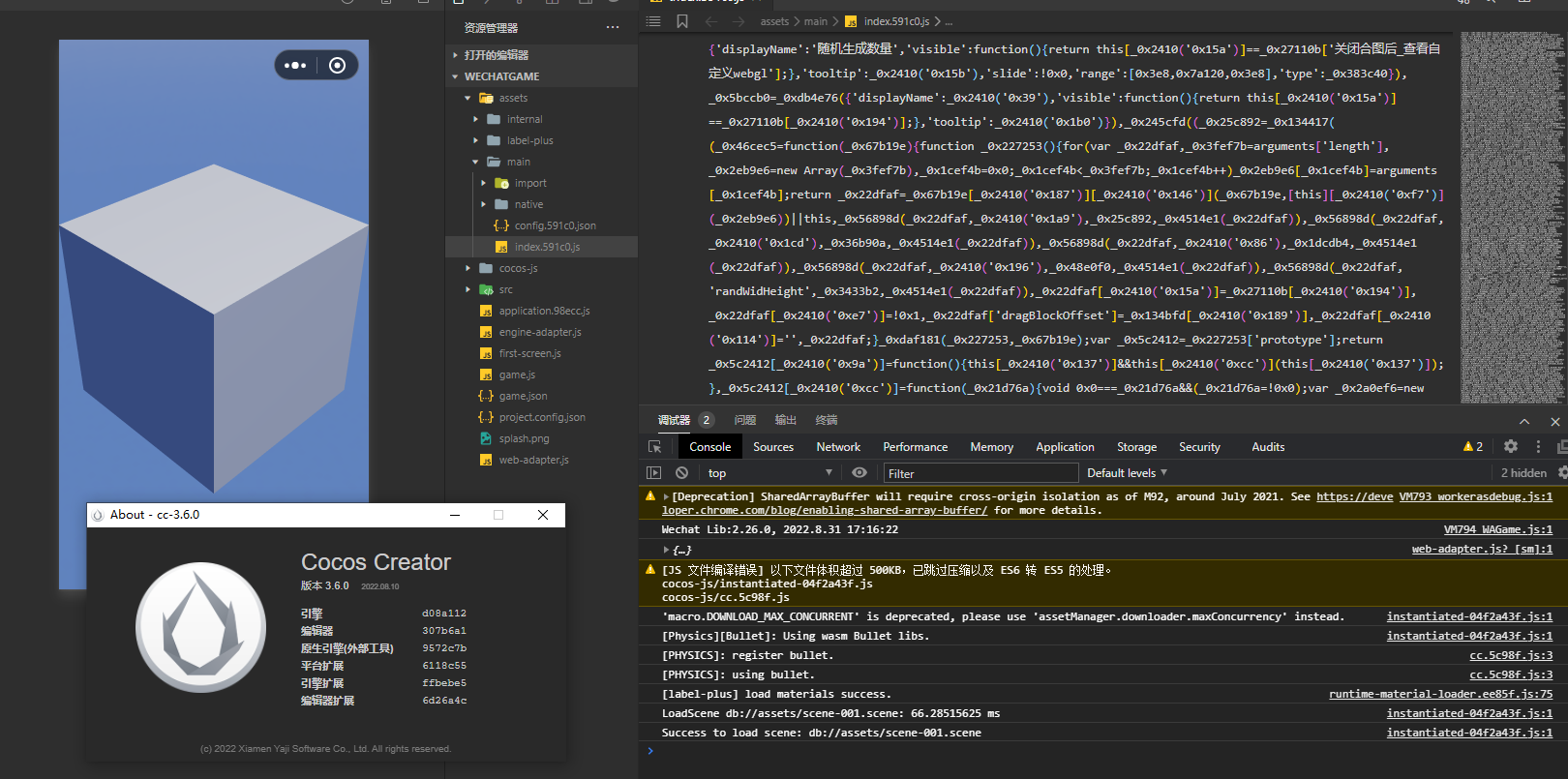
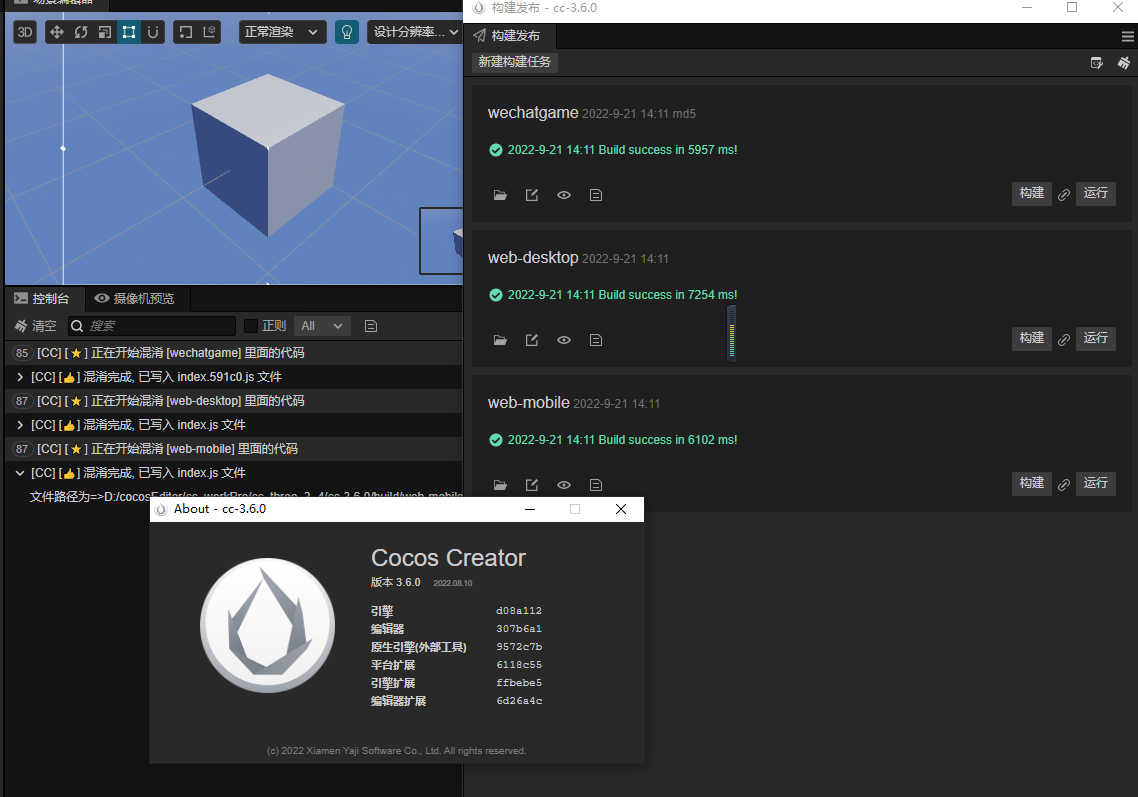
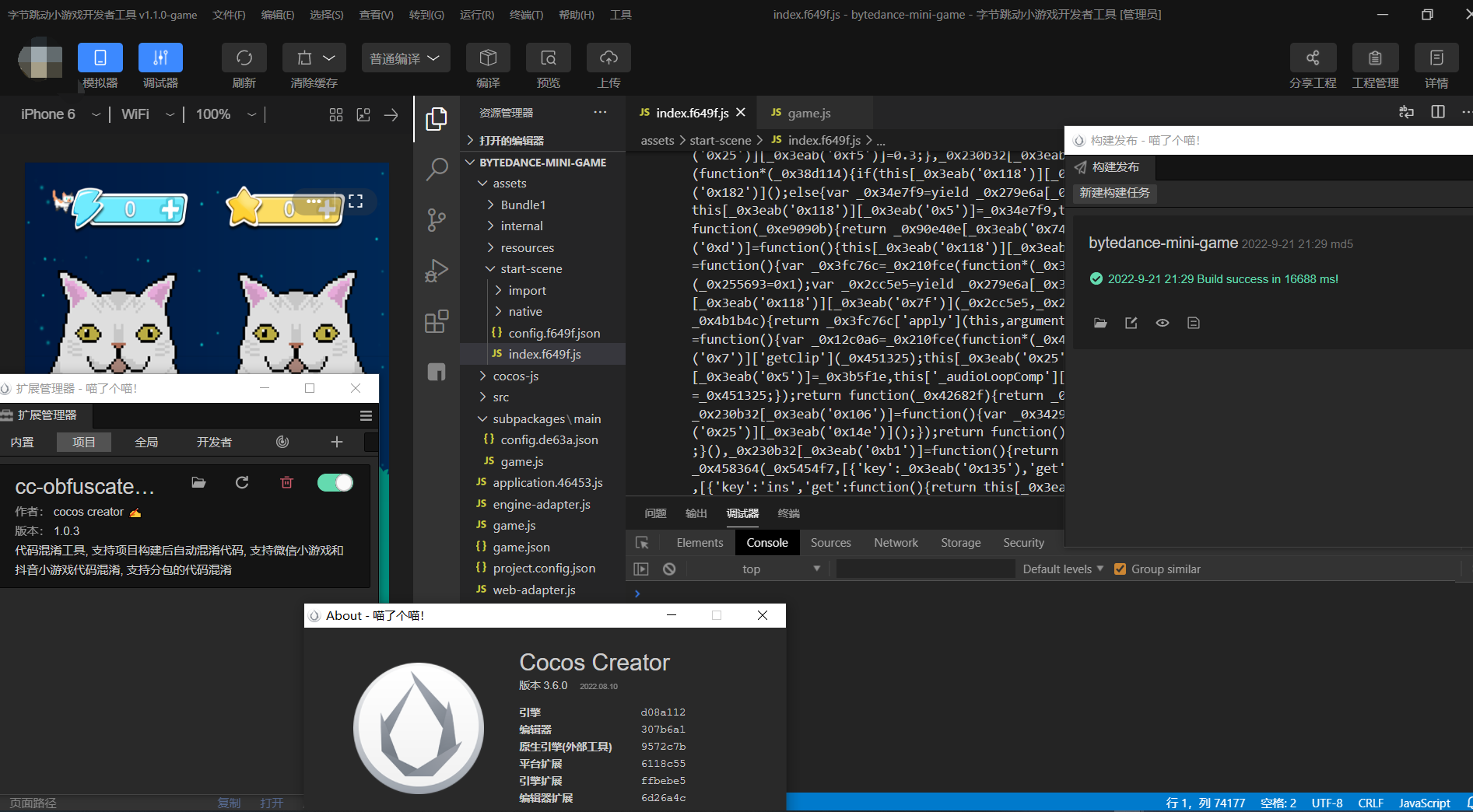
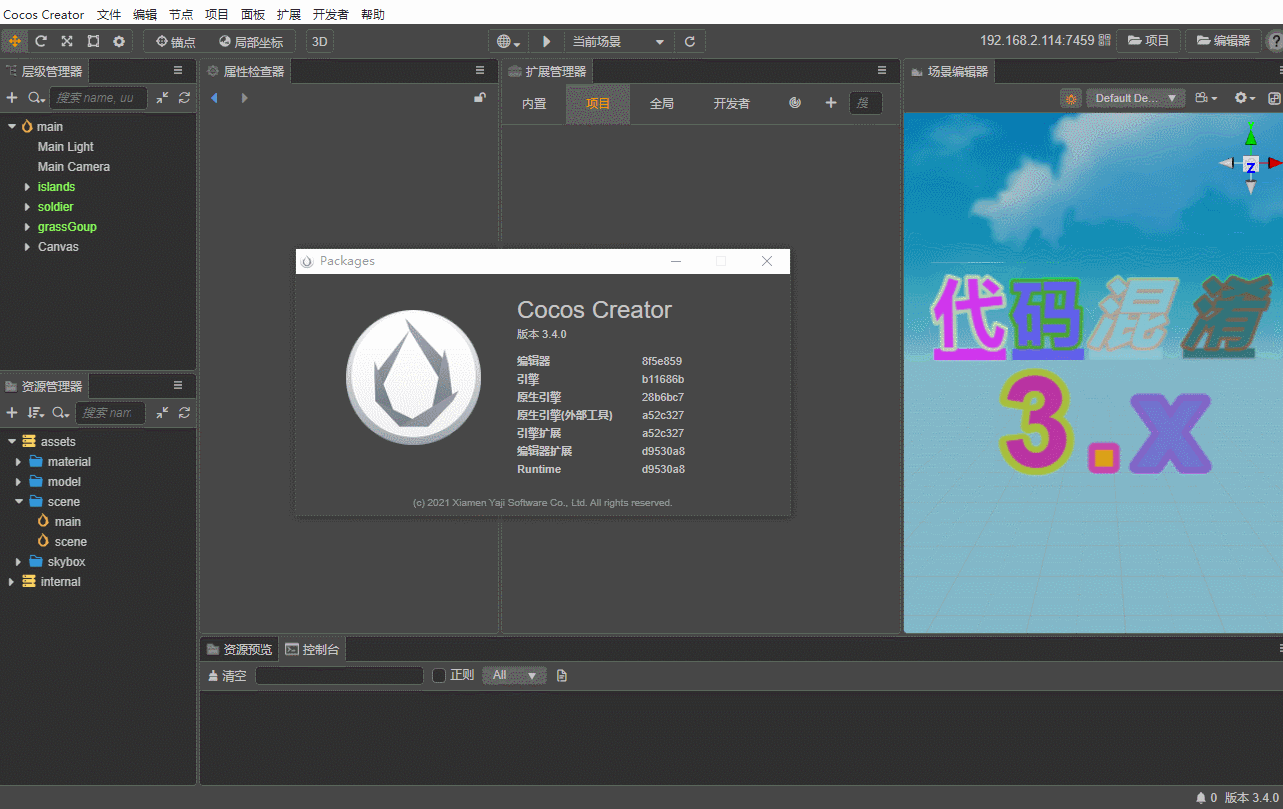
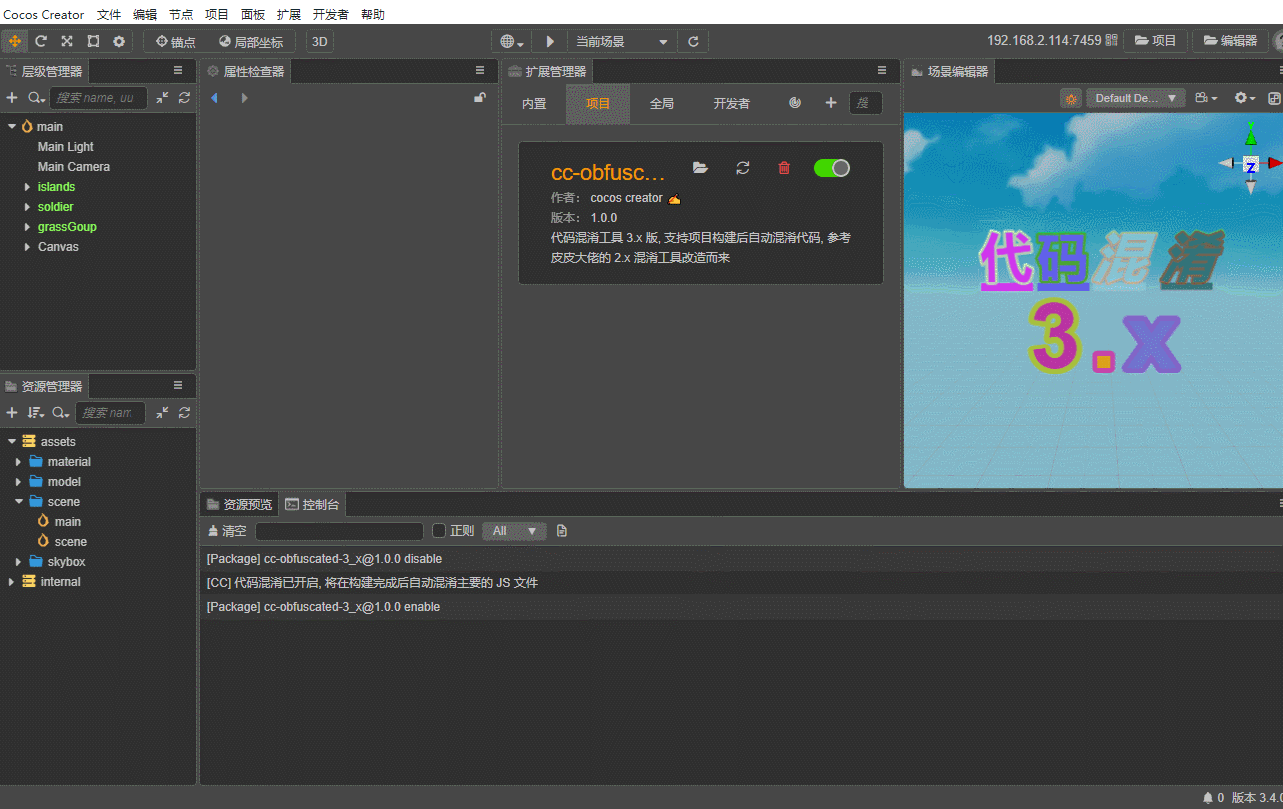
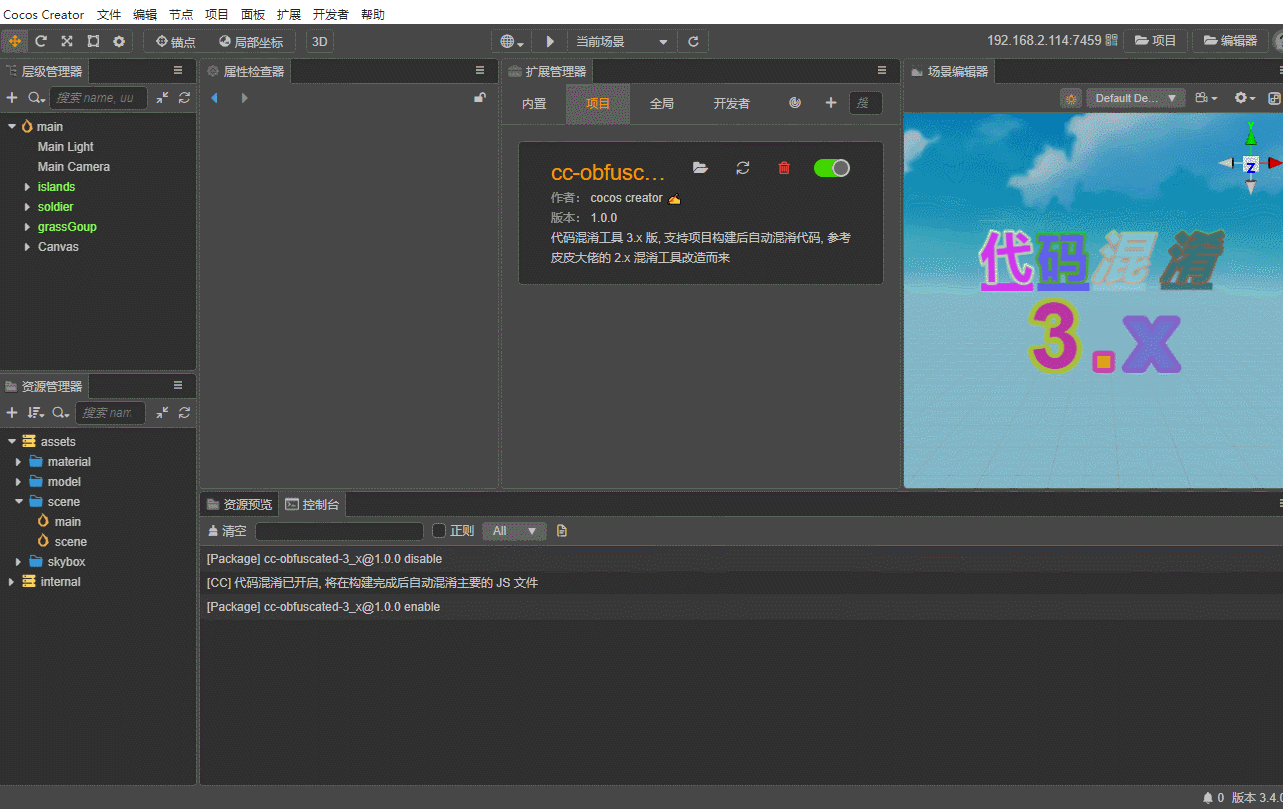
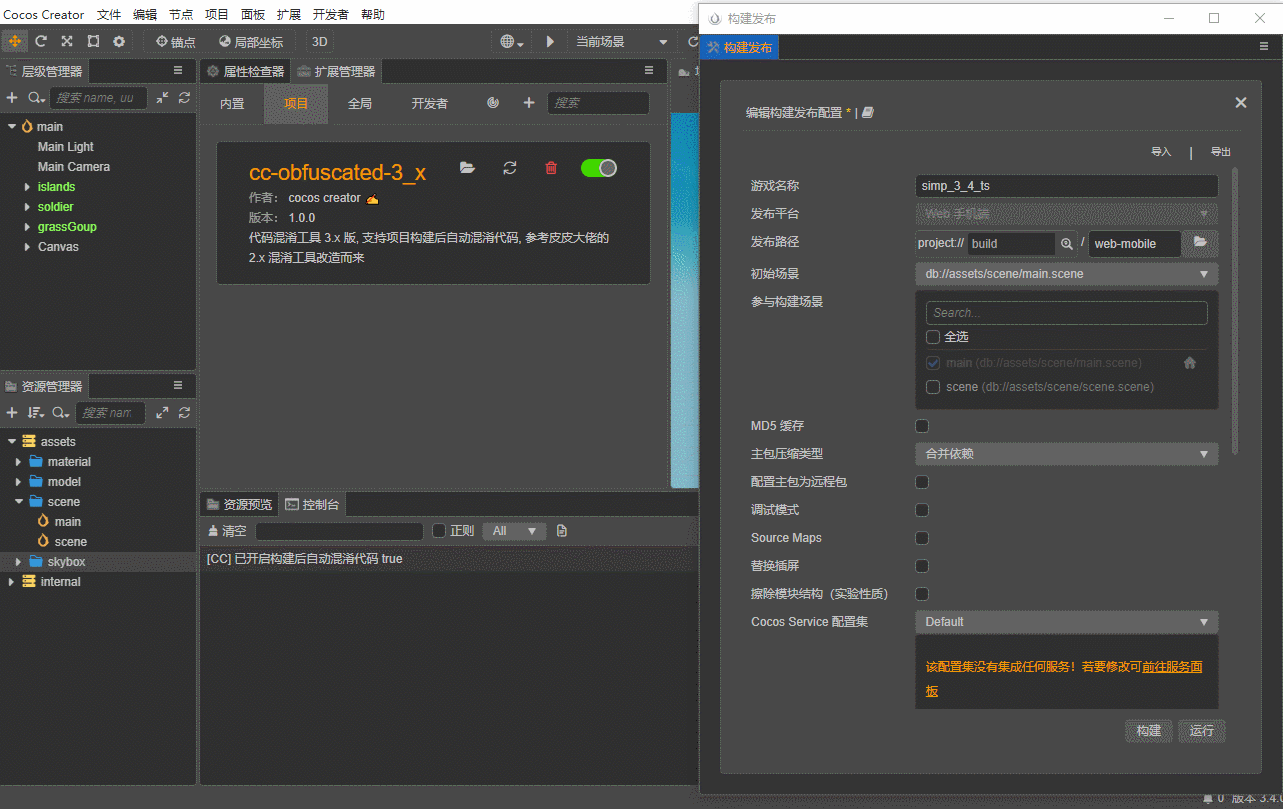
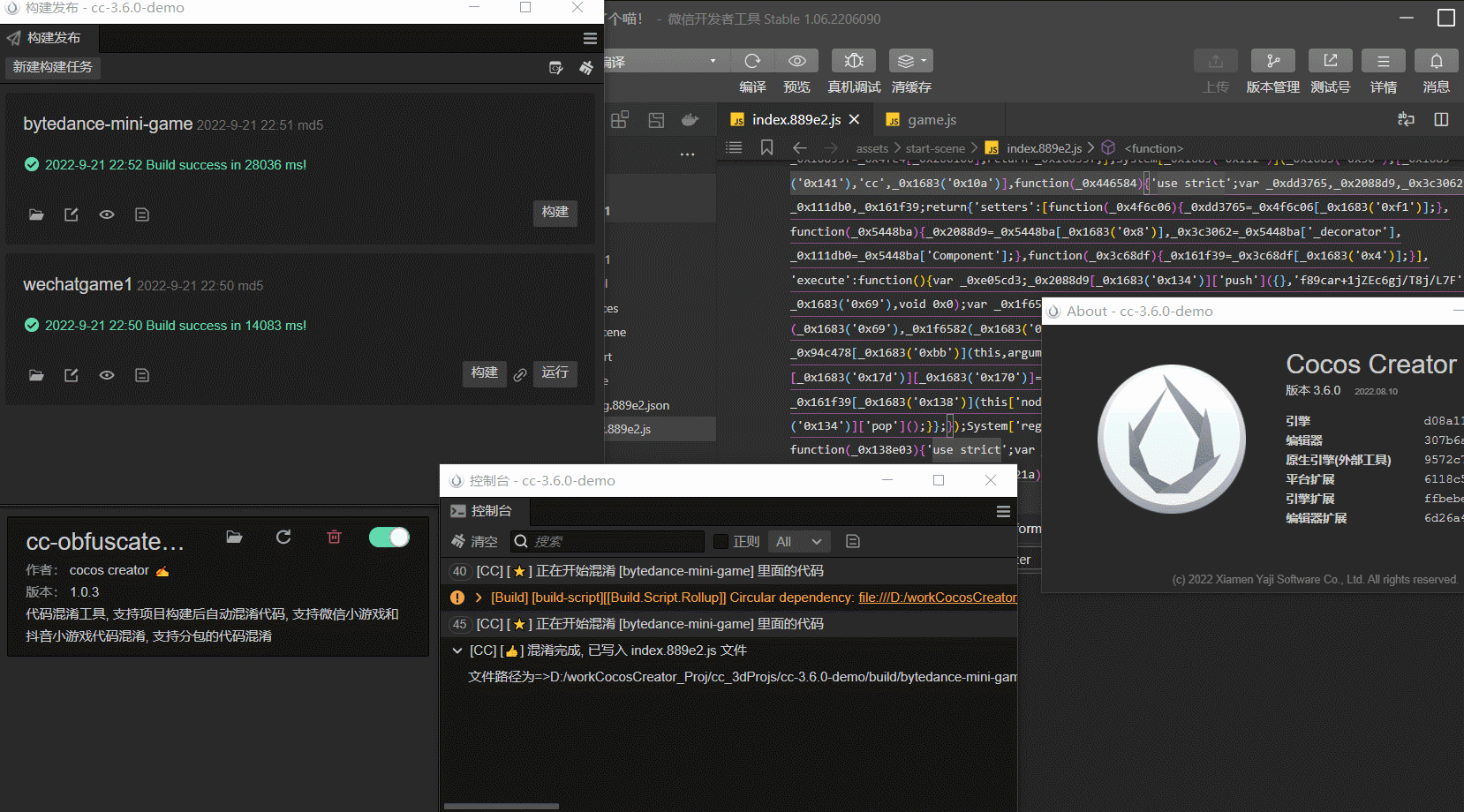
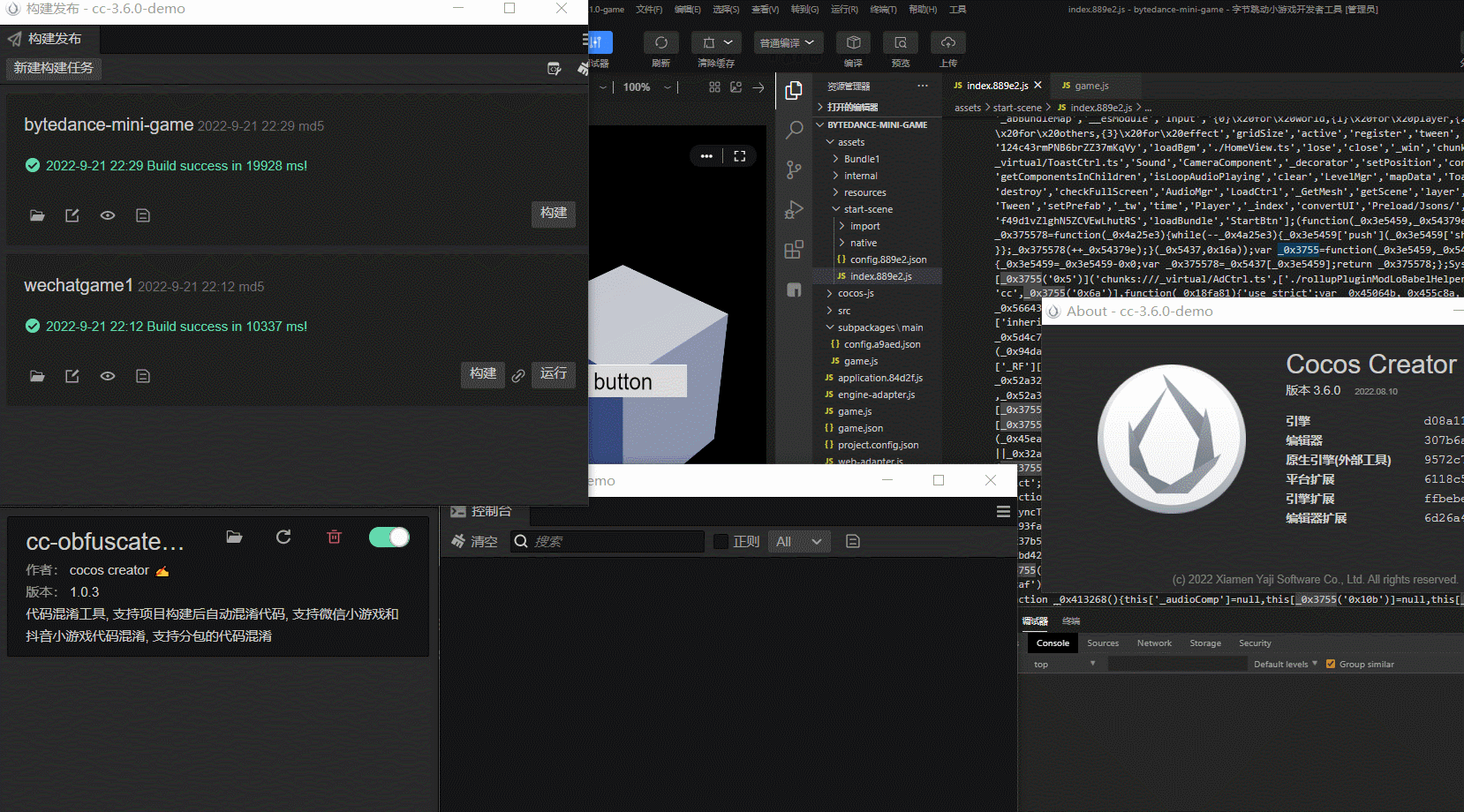
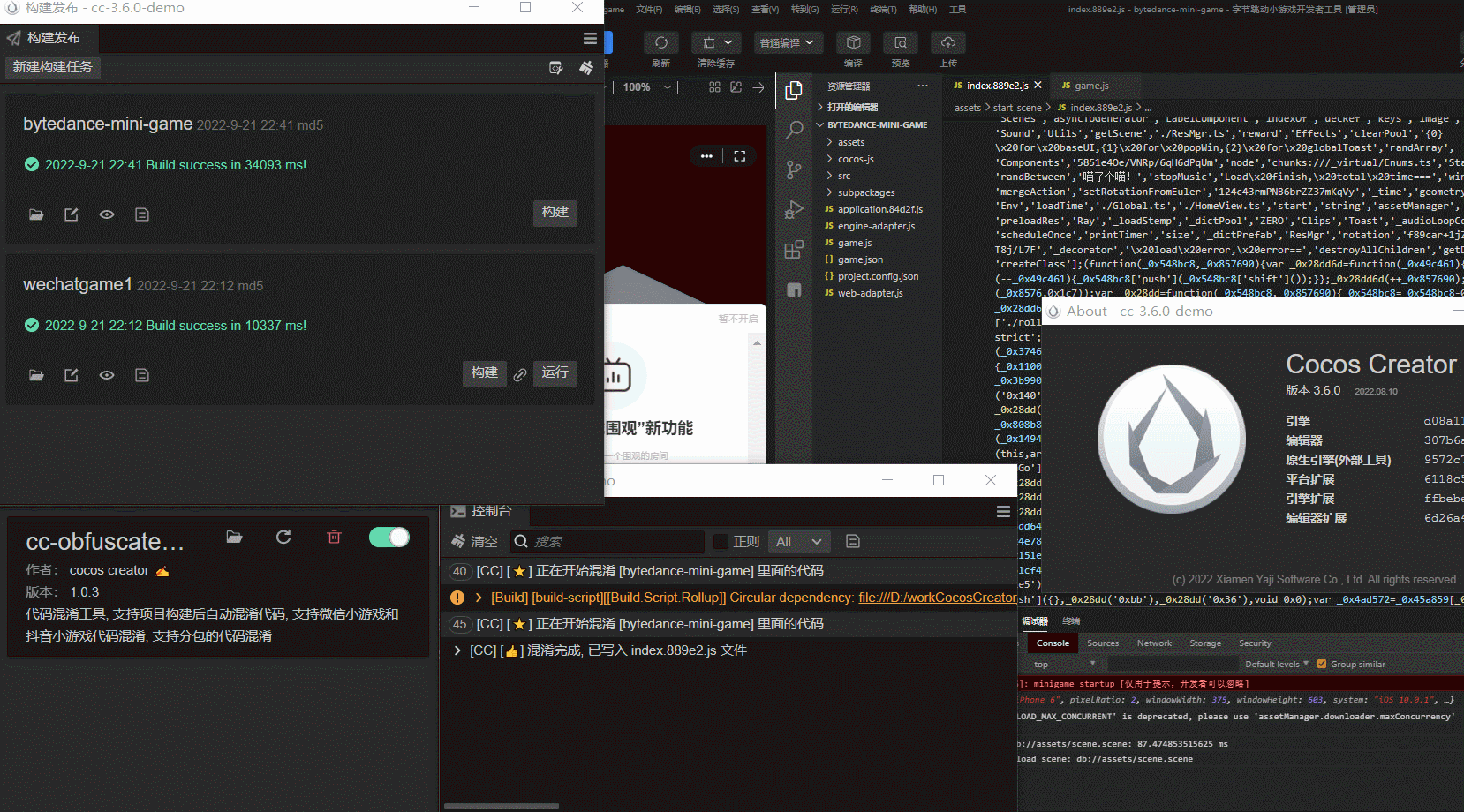
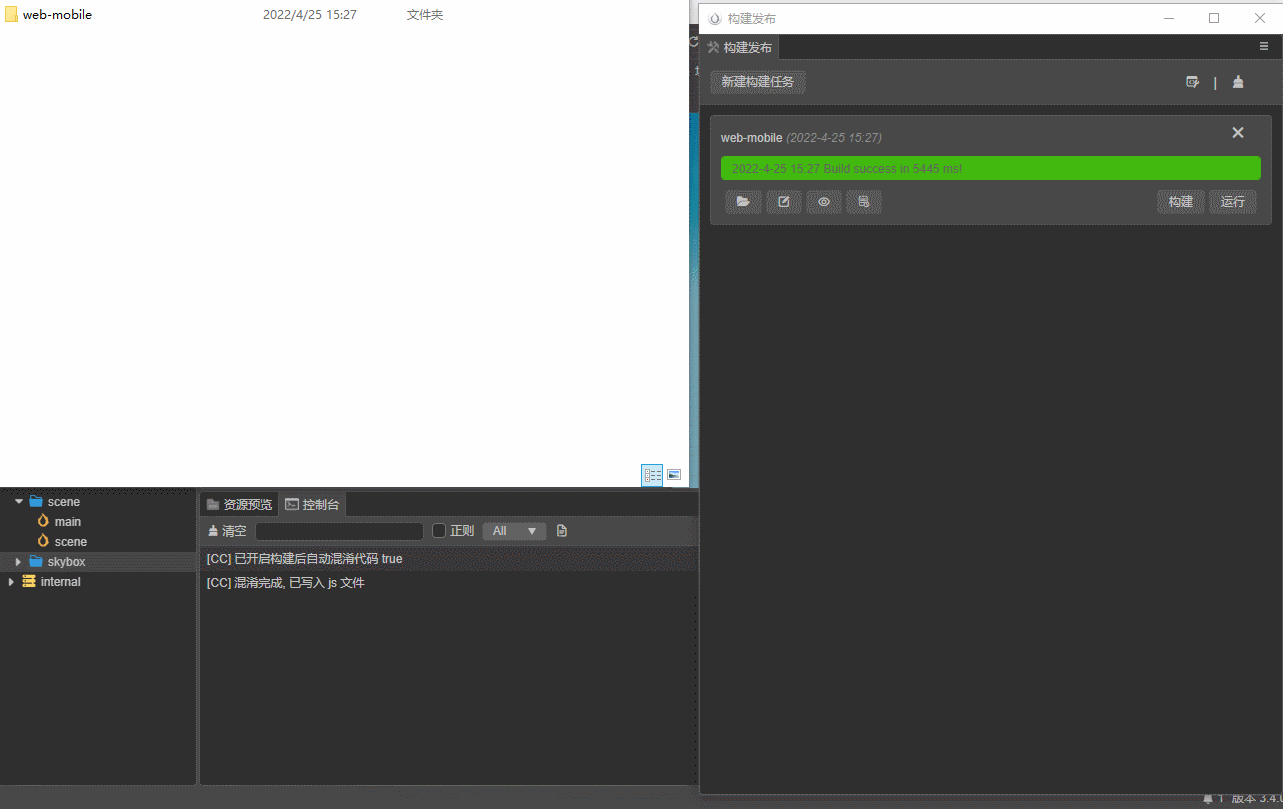
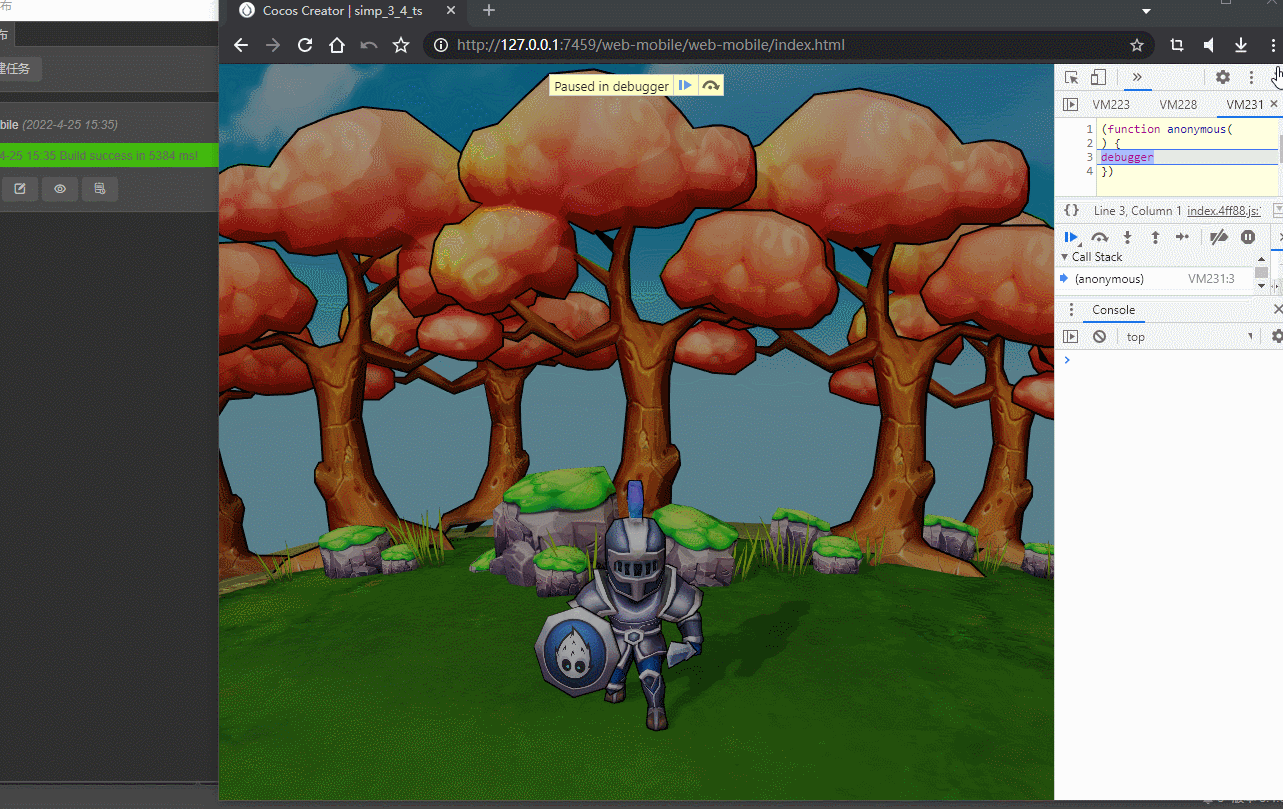
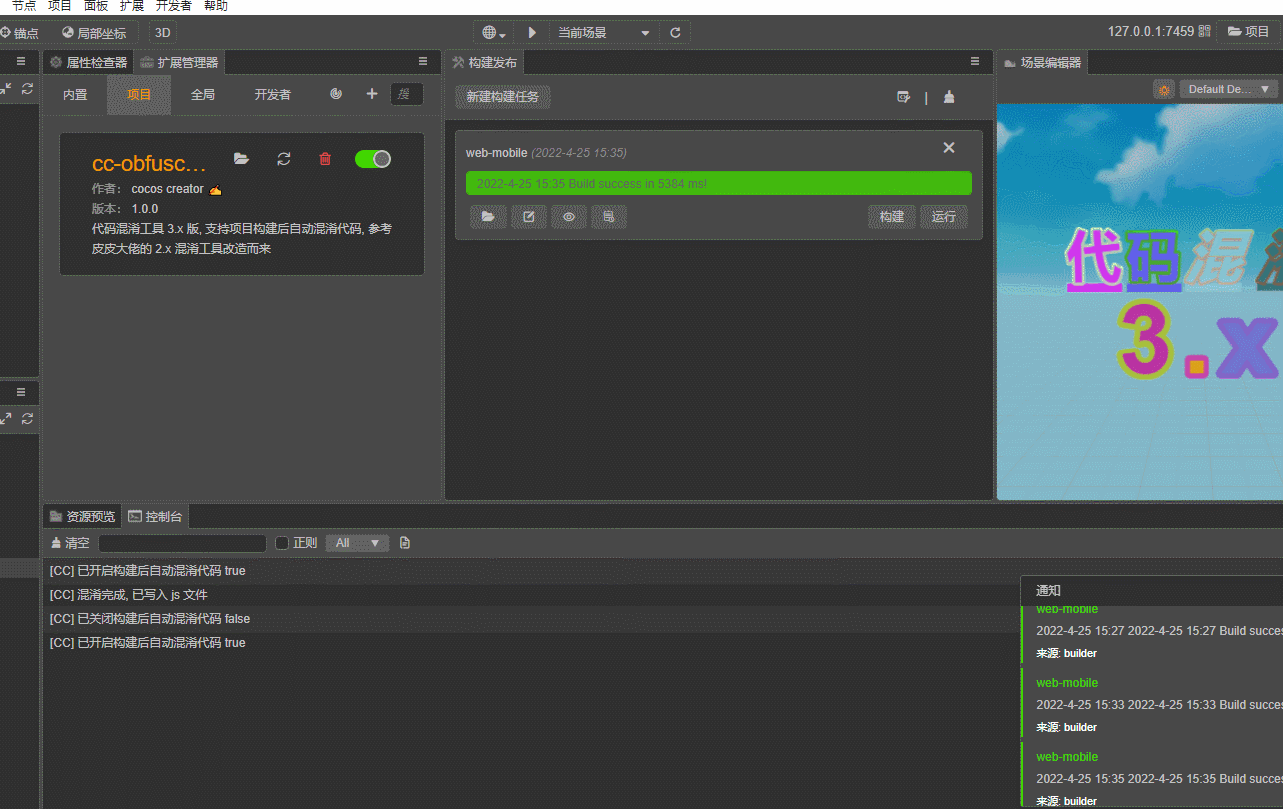
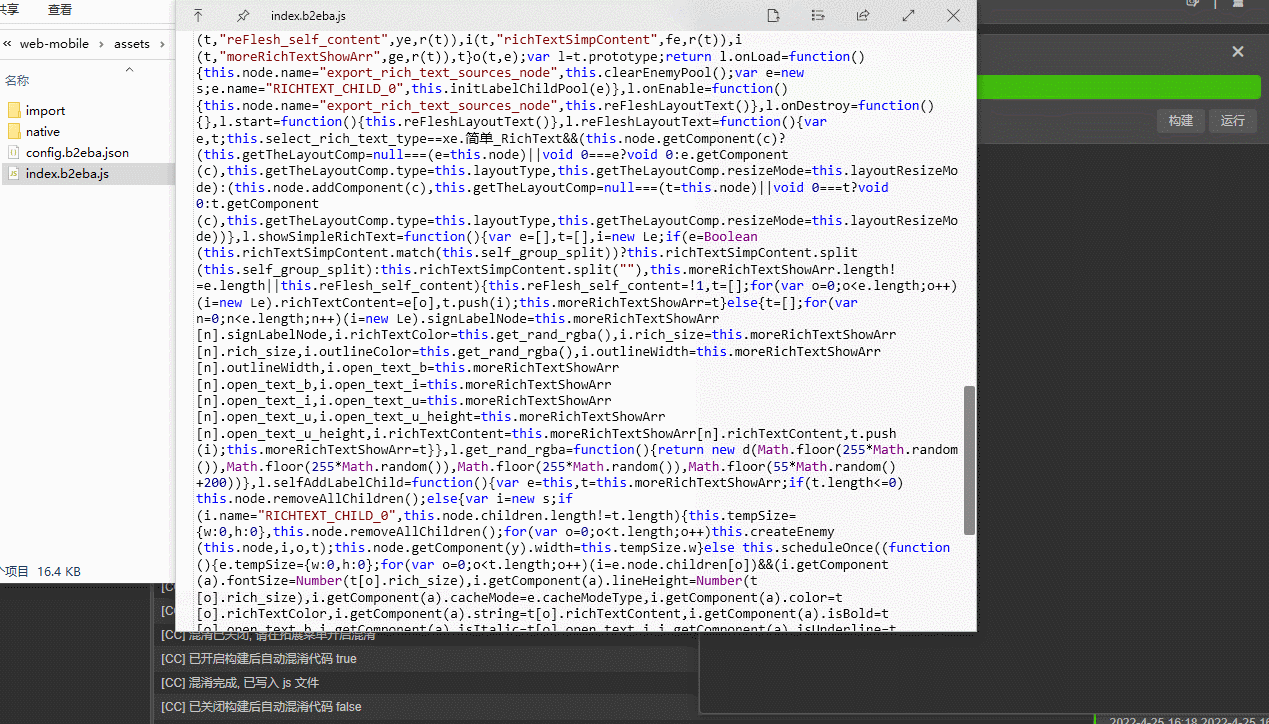
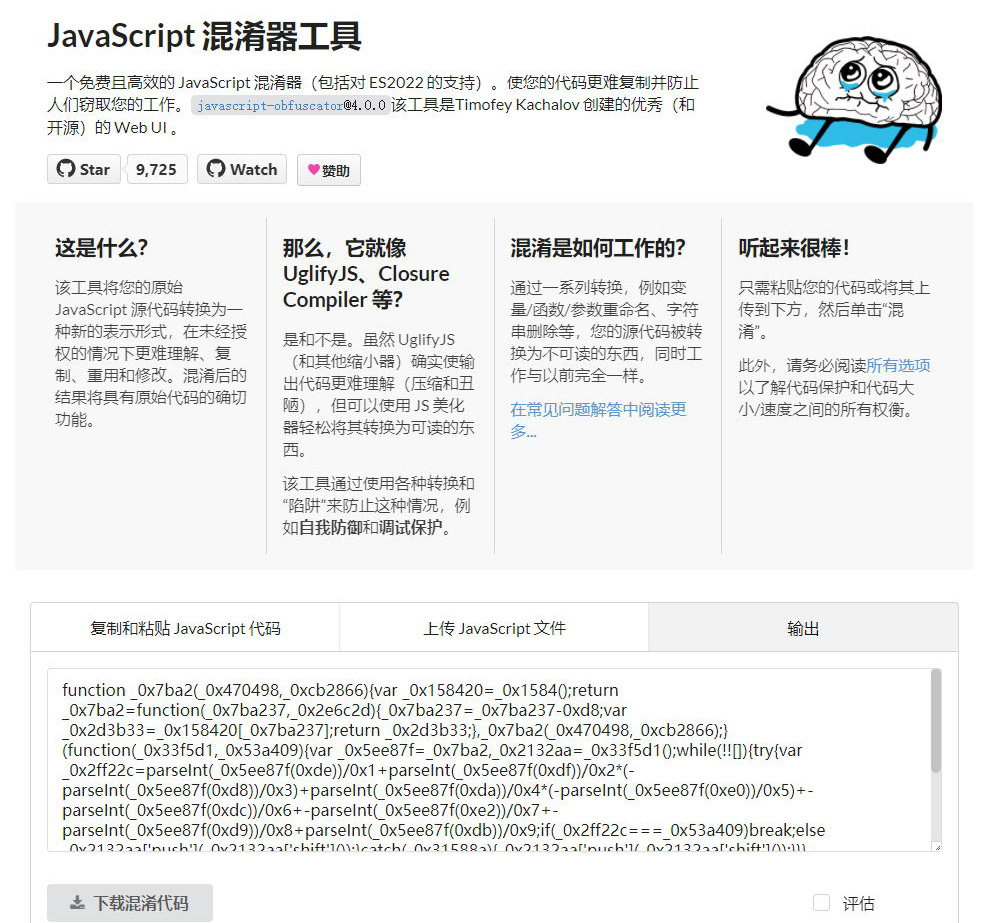
 此选项极大地影响性能,运行时速度降低 1.5 倍。用于
此选项极大地影响性能,运行时速度降低 1.5 倍。用于
